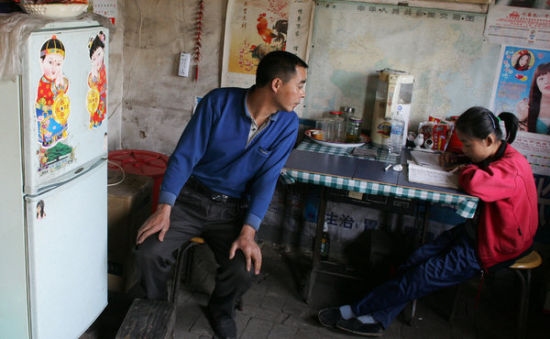美媒:教育豪赌让中国农村家庭不堪重负
美国《纽约时报》2月16日文章,原题:在中国,所有赌注都押在家中的大学生身上 在这一生中,吴叶兵(音)几乎每个工作日都下矿井,在幽闭坑道内令人窒息的煤尘中挥舞电钻,每月能挣500美元的吴只有一个目标:供女儿上学。每年5月至7月,他妻子曹薇萍(音)天天在苹果园里从早忙到晚,其他时间则到商店打工,所有的钱都被用于女儿的教育。
许多西方家庭也为子女教育煞费苦心,为其积攒大学学费。但与数百万含辛茹苦供孩子上学的中国低收入父母所承受的重负相比,那些付出算不上什么。
在中国西部小村长大的吴和曹节省了一辈子。近20年来,他们一直住在狭小透风的旧房里,为省路费和礼品钱并有机会挣加班费,已连续5年没回老家过年。由于他们的艰辛付出,女儿吴曹颖(音)已成为大二学生。同越来越多的中国大学生一样,她的受教育程度已远超父母曾经的奢望。但父母的辛劳未必能获得回报。大学文凭已不能确保高收入工作,因为过去10年来中国的大学毕业生人数已翻两番。
每年花费父母所有收入一半以上的校园生活令吴左右为难,她正考虑辍学并找份工作。“女儿每次打电话都说不想上学了”,曹薇萍说,“我说‘为了给我们养老,你必须继续学习。’她说‘这样压力太大,我不想再考虑这些责任。’”
对中国的农村父母而言,每年的大学费用相当于6至15个月的劳作收入。美国私立大学每年的平均费用与其人均年收入基本相当,州立大学费用仅为前者的一半,且美国学生普遍比中国学生更容易获得助学金。中国父母的负担并不仅限于大学,还面临与小学、初高中有关的诸多费用。许多人为提高子女成绩还请家教。与美国父母相比,一旦子女毕业后找不到工作,将所有积蓄都倾注于孩子教育的中国父母将几乎没什么退路。
吴一家的经历是一扇窗,既见证了中国与日俱增的教育机遇,也凸显中国家庭承受的经济负担。父母倾其所有供儿女读书也说明,最近10年在培养大学生方面中国为何令美国望尘莫及。但伴随教育成本居高不下的是中国经济增长放缓,以及近期大学毕业生失业率激增。像吴这样的年轻人毕业后能否找到工作养活自己遑论为父母排忧解难,将考验中国未来数年内维持经济快速增长并保持政治和社会稳定的能力。(作者基斯布拉德舍,王会聪译)
纽约时报原文:
HANJING, China — Wu Yiebing has been going down coal shafts practically every workday of his life, wrestling an electric drill for $500 a month in the choking dust of claustrophobic tunnels, with one goal in mind: paying for his daughter’s education。
The Education Revolution
Articles in this series are examining the promises and challenges that China faces as it tries to educate its citizens more broadly。
His wife, Cao Weiping, toils from dawn to sunset in orchards every day during apple season in May and June. She earns $12 a day tying little plastic bags one at a time around 3,000 young apples on trees, to protect them from insects. The rest of the year she works as a substitute store clerk, earning several dollars a day, all going toward their daughter’s education。
Many families in the West sacrifice to put their children through school, saving for college educations that they hope will lead to a better life. Few efforts can compare with the heavy financial burden that millions of lower-income Chinese parents now endure as they push their children to obtain as much education as possible。
Yet a college degree no longer ensures a well-paying job, because the number of graduates in China has quadrupled in the last decade。
Mr. Wu and Mrs. Cao, who grew up in tiny villages in western China and became migrants in search of better-paying work, have scrimped their entire lives. For nearly two decades, they have lived in a cramped and drafty 200-square-foot house with a thatch roof. They have never owned a car. They do not take vacations — they have never seen the ocean. They have skipped traditional New Year trips to their ancestral village for up to five straight years to save on bus fares and gifts, and for Mr. Wu to earn extra holiday pay in the mines. Despite their frugality, they have essentially no retirement savings。
Thanks to these sacrifices, their daughter, Wu Caoying, is now a 19-year-old college sophomore. She is among the growing millions of Chinese college students who have gone much farther than their parents could have dreamed when they were growing up. For all the hard work of Ms. Wu’s father and mother, however, they aren’t certain it will pay off. Their daughter is ambivalent about staying in school, where the tuition, room and board cost more than half her parents’ combined annual income. A slightly above-average student, she thinks of dropping out, finding a job and earning money。
“Every time my daughter calls home, she says, ‘I don’t want to continue this,’ ” Mrs. Cao said. “And I say, ‘You’ve got to keep studying to take care of us when we get old’, and she says, ‘That’s too much pressure, I don’t want to think about all that responsibility.’ ”
Ms. Wu dreams of working at a big company, but knows that many graduates end up jobless. “I think I may start my own small company,” she says, while acknowledging she doesn’t have the money or experience to run one。
For a rural parent in China, each year of higher education costs six to 15 months’ labor, and it is hard for children from poor families to get scholarships or other government financial support. A year at the average private university in the United States similarly equals almost a year’s income for the average wage earner, while an in-state public university costs about six months’ pay, but financial aid is generally easier to obtain than in China. Moreover, an American family that spends half its income helping a child through college has more spending power with the other half of its income than a rural Chinese family earning less than $5,000 a year。
It isn’t just the cost of college that burdens Chinese parents. They face many fees associated with sending their children to elementary, middle and high schools. Many parents also hire tutors, so their children can score high enough on entrance exams to get into college. American families that invest heavily in their children’s educations can fall back on Medicare,
Social Security and other social programs in their old age. Chinese citizens who bet all of their savings on their children’s educations have far fewer options if their offspring are unable to find a job on graduation。
The experiences of Wu Caoying, whose family The New York Times has tracked for seven years, are a window into the expanding educational opportunities and the financial obstacles faced by families all over China。
Her parents’ sacrifices to educate their daughter explain how the country has managed to leap far ahead of the United States in producing college graduates over the last decade, with eight million Chinese now getting degrees annually from universities and community colleges。
上一页123下一页濠电姷鏁告慨鐑藉极閸涘﹥鍙忛柣鎴f閺嬩線鏌涘☉姗堟敾闁告瑥绻橀弻锝夊箣閿濆棭妫勯梺鍝勵儎缁舵岸寮诲☉妯锋婵鐗婇弫楣冩⒑閸涘﹦鎳冪紒缁橈耿瀵鏁愭径濠勵吅闂佹寧绻傚Λ顓炍涢崟顖涒拺闁告繂瀚烽崕搴g磼閼搁潧鍝虹€殿喛顕ч埥澶娢熼柨瀣垫綌婵犳鍠楅〃鍛存偋婵犲洤鏋佸Δ锝呭暞閳锋垿鏌涘☉姗堝姛闁瑰啿鍟扮槐鎺旂磼濮楀牐鈧法鈧鍠栭…鐑藉极閹邦厼绶炲┑鐘插閸氬懘姊绘担鐟邦嚋缂佽鍊歌灋妞ゆ挾鍊e☉銏犵妞ゆ牗绋堥幏娲⒑閸涘﹦绠撻悗姘卞厴瀹曟洘鎯旈敐鍥╋紲闂佸吋鎮傚ḿ褔宕搹鍏夊亾濞堝灝鏋︽い鏇嗗洤鐓″璺好¢悢鍏肩叆閻庯絽鐏氱紞灞解攽閻樻剚鍟忛柛鐘愁殜閵嗗啴宕ㄧ€涙ê浜辨繝鐢靛Т濞层倝寮告担鑲濇棃鏁愰崨顓熸闂佹娊鏀遍崹鍧楀蓟濞戞ǚ妲堟慨妤€鐗嗘慨娑㈡⒑閻熸澘鏆遍柛鐔稿濡叉劙骞掗弮鍌滐紲濠殿喗顨呴悧鎰板焵椤掑啯纭堕柍褜鍓氶鏍窗閺嶎厸鈧箓鎮滈挊澶嬬€梺褰掑亰閸樿偐娆㈤悙娴嬫斀闁绘ɑ褰冮鎾煕濮橆剚鍤囨慨濠勭帛閹峰懘鎮烽柇锕€娈濈紓鍌欐祰椤曆囧磹濮濆瞼浜辨俊鐐€栭幐楣冨磹閿濆應妲堥柕蹇曞Х椤︽澘顪冮妶鍡欏缂佸鐗撻獮蹇撁洪鍛嫼闂佸憡绋戦敃锔剧不閹剧粯鍊垫慨妯哄船閸樺鈧娲樺ú姗€骞嗛弮鍫熸櫜闁搞儮鏅槐鏌ユ⒒娴gǹ鎮戦柟顔煎€稿玻鑳樄鐎规洦鍋婇幖褰掑礂婢跺﹣澹曞┑鐐茬墕閻忔繈寮稿☉娆嶄簻妞ゆ挾濮撮崢瀛橆殽閻愭彃鏆e┑顔瑰亾闂侀潧鐗嗛幊鎰八囪閺岋綀绠涢幘鍓侇唹闂佺粯顨嗛〃鍫ュ焵椤掍胶鐓紒顔界懃椤繘鎼圭憴鍕彴闂佸搫琚崕鍗烆嚕閺夊簱鏀介柣鎰緲鐏忓啴鏌涢弴銊ュ箻鐟滄壆鍋撶换婵嬫偨闂堟刀銏犆圭涵椋庣М闁轰焦鍔栧鍕熺紒妯荤彟闂傚倷绀侀幉锟犲箰閸℃稑妞介柛鎰典簻缁ㄣ儵姊婚崒姘偓鐑芥嚄閸撲礁鍨濇い鏍仜缁€澶愭煥閺囩偛鈧摜绮堥崼鐔虹闁糕剝蓱鐏忣厾绱掗埀顒佸緞閹邦厾鍘梺鍓插亝缁诲啴藟閹捐秮鐟扳堪閸曨厾鐓侀梺闈涙搐鐎氫即鐛Ο鍏煎磯闁烩晜甯囬崹浠嬪蓟濞戞鐔哥瑹椤栨碍顔嶉梻渚€鈧偛鑻晶顖涖亜閺冣偓閻楃姴鐣锋导鏉戝唨妞ゆ挻绋堥崑鎾绘晝閸屾稑鈧鏌﹀Ο渚Ч闁诲寒鍓熷娲捶椤撶儐鏆┑鐘灪閿氭い鏂跨箰閳规垹鈧綆鍋嗛崢閬嶆煟韫囨洖浠滃褌绮欓幆灞剧節閸ャ劎鍘搁柣搴秵娴滎亪宕i崟顖涚厸閻忕偟鏅倴闂佸綊顥撴繛鈧€殿喖顭锋俊鐑藉Ψ閵夈儱鎸ゆ繝寰锋澘鈧鎱ㄩ悜钘夌;婵炴垶顭傚☉妯峰牚闁糕晞娉涘ú顓㈠箹瑜版帩鏁冮柣妯夸含閻╁酣姊绘担鍛婃儓闁稿﹥鎮傞幃妯衡攽鐎e灚鏅滃銈嗗姂閸婃澹曟總绋跨骇闁割偅绋戞俊鐣屸偓瑙勬礀閻ジ鍩€椤掑喚娼愭繛鍙夅缚閺侇噣骞掑Δ鈧悡婵嬪箹濞n剙濡肩紒鐘冲▕閺岀喓鈧稒岣跨粻鎾绘煠閸偄濮堢紒缁樼箞閹粙妫冨ù璁圭稻閵囧嫰寮埀顒勬偋閻樿尙鏆﹂柡澶庮嚦閺冨牆宸濇い鎾跺閸炲爼姊绘担绛嬫綈闁稿海鍘ц灋闁告洦鍘炬稉宥夋煛瀹ュ啫濡虹紒璇叉閵囧嫰寮介妸褎鍣銈嗗笧閸犳劗鎹㈠☉姘剨闁哄秲鍔嶉悵姘舵⒑鐠団€虫灕妞ゎ偄顦玻鍧楊敂閸繄顓煎銈嗘⒐鐎氬酣顢橀姀鈾€鎷洪梺鍦圭€涒晝绮堥埀顒勬⒑缁嬪尅宸ョ紓宥咃躬楠炲啴鏁撻悩鎻掑祮闂侀潧楠忕槐鏇㈠储閹间焦鈷戦柟鑲╁仜閸旀﹢鏌涙惔銈夊摵濞e洤锕ョ缓浠嬪川婵犲嫬骞愰梺璇插嚱缁插宕濆畝鍕劦妞ゆ帊鑳剁粻鐐碘偓娈垮枛椤兘寮幇顓炵窞濠电偐鎷冮崶銊у幈闁诲繒鍋涙晶浠嬫偂椤栨凹鐔嗛悷娆忓缁€瀣叏婵犲偆鐓肩€规洘甯掗~婵嬵敄閽樺澹曟俊鐐差儏濞寸兘鎯岄崱妞曞綊鏁愭径瀣╂唉闂佸吋婢樺ḿ鈥愁潖濞差亶鏁嗛柍褜鍓涚划鏃傗偓鐢登归ˉ姘攽閻樺磭顣查柣鎾寸懇閺岀喓鎲撮崟顐⑿曢梺鎼炲€栭悷褏妲愰幒妤佸亹闁告劖褰冮幗鐢告⒑鐠団€虫灍闁挎洏鍨介獮鍐ㄢ枎閹寸偛纾柣鐐寸▓閸撴繈鎮楅崗鑲╃瘈闁汇垽娼ф禒锕傛煕椤垵鐏︾€规洜鎳撶叅妞ゅ繐瀚敍娆撴⒑缂佹ê鐏卞┑顔哄€濋幃锟犳偄閸忚偐鍘棅顐㈡搐椤戝懘鎮橀鍫熺厸闁糕€崇箲濞呭﹪鏌$仦璇插闁宠棄顦埢搴ㄥ箣閻樺灚姣囩紓鍌氬€烽懗鍓佸垝椤栨粎鐭欓柟鐑樺灋缂傛岸鐓崶銊р槈缂佲偓閸垺鍠愰幖娣妼绾捐崵鎲搁弬娆炬綎婵炲樊浜滄导鐘绘煕閺囥劌澧い搴㈢洴濮婅櫣绮欏▎鎯у壈闂佹寧娲忛崐婵嬪箖妤e啯鐓ラ悗锝庡墴濡绢噣姊洪崨濠冨碍鐎殿喖鐖煎鎻掆堪閸啿鎷洪梺鍛婃尰瑜板啯绂嶉悙鐑樼厱闁绘ǹ娅曞畷宀€鈧娲忛崹鍝勧缚韫囨稑惟鐟滃繘鎯侀崼銉︹拺婵懓娲ら悘鍙夌箾娴e啿鍟伴幗銉╂⒒閸屾瑧顦﹂柟鑺ョ矒瀹曟娊濡烽埡浣哥€悗瑙勬礀濞层倝宕瑰┑瀣厱妞ゆ劑鍊曢弸搴g磼閸撲礁浠遍柡宀€鍠栭弻鍥晝閳ь剟鐛鈧弻娑樜熼崷顓犵厯濠碘槅鍋勯幊姗€銆侀弴銏狀潊闁炽儲鍓氬Σ閬嶆⒒娴g儤鍤€闁硅绻濋獮鍐磼濮樼厧娈ㄩ梺瑙勫劶婵倝寮查弻銉︾厱闁斥晛鍘鹃鍕靛殨闁圭ǹ娴风弧鈧梺姹囧灲濞佳冪摥闂備礁鎽滈崳銉╁垂閼稿吀绻嗛梻鍫熺▓閺€浠嬫煕閵夈劌鐓愭い鏃€妫冨铏圭磼濡搫顫嶅┑鐐插悑閻燂箓骞堥妸鈺侀唶闁靛濡囬崢闈涱渻閵堝棛澧紒瀣浮钘熼柛顐犲劜閻撴稑霉閿濆洦鍤€濠殿喖绉堕埀顒冾潐濞叉牠鎮ユ總绋挎槬闁跨喓濮寸壕鍏肩箾閹存繂鑸归柡鍜佸亰濮婂宕掑顑藉亾閹间礁纾归柟闂寸绾惧綊鏌i幋锝呅撻柛銈呭閺屾盯顢曢敐鍡欘槬缂備胶濮锋繛鈧柡宀€鍠栭獮鎴﹀箛闂堟稒顔勯梻浣圭湽閸娿倝宕抽敐澶婅摕婵炴垶绮犲Σ鐓庮渻閵堝啫濡兼俊顐g箞楠炲啴鏁撻悩鑼姦濡炪倖甯掔€氼參鍩涢幋锔界厵缂佸瀵ч幑锝囩磼閻樿櫕宕岄柡宀€鍠庨悾锟犳焽閿曗偓閸撳爼鎮楃憴鍕闁轰浇顕ч锝夊箻椤旂⒈娼婇梺鎸庣☉鐎氼剟鐛澶嬧拻濞达絿鐡旈崵鍐煕閵娿儱鑸规い顓炵仢铻f繛鍡欏亾濮f劙姊婚崒姘偓鐑芥嚄閼哥數浠氶梻浣瑰濞测晝绮婚幘宕囨殾婵°倐鍋撴い顐g矒閸┾偓妞ゆ巻鍋撴い鏇稻缁绘繂顫濋鐔哥彸濠电姰鍨煎▔娑㈡晝閿曞偆鏁囨繛宸簼閳锋垹绱撴担濮戭亝鎱ㄩ崒鐐寸厱闁哄倹瀵ч幑锝嗕繆閸欏濮堥悗浣冨亹閳ь剚绋掕彜闁归攱妞藉娲川婵犲嫧妲堝Δ妤婁簽閺佸骞婇幘璇插瀭妞ゆ梹姘ㄩ幊鎾汇偑娴兼潙绀冩い蹇撳閸樹粙鏌f惔銏╁晱闁哥姵鐗犻垾锕傛倻閽樺鐎梺鍦濠㈡﹢鐛姀鈥茬箚妞ゆ牗纰嶉幆鍫濃攽闄囧▍鏇熺┍婵犲洦鍊锋い蹇撳閸嬫捇寮介鐔蜂罕濠德板€曢崯顐﹀垂濠靛牃鍋撻崗澶婁壕闂佸憡娲﹂崑鍛i鍕厽闊洦娲栨禒婊冾熆瑜忛弲顐㈩嚕瑜旈崺鈧い鎺戝閳锋垿鏌涢幇顖氱毢婵炲牓浜堕弻娑氣偓锝庡亝瀹曞矂鏌$仦鍓ф创妤犵偛娲俊鎼佹晜閻e苯绲鹃梺璇叉唉椤煤濡崵绠惧┑鐘叉搐缁犳牗淇婇妶鍌氫壕闂佸磭绮幑鍥х暦瑜版帩鏁婇柤鎭掑労閸炴煡姊婚崒娆戝妽闁诡喖鐖煎畷鏇炩堪閸繂绐涘銈嗘尵閸婎偊寮撮悙鈺傛杸闂佹寧绋戠€氼剚绂嶆總鍛婄厱濠电姴鍟版晶閬嶆煛娓氬洤娅嶆鐐村浮瀵剟宕崟顏勵棜婵犳鍠楀玻鍧楀储瑜嶉锝夘敋閳ь剟寮诲☉銏犵厸闁稿本绮嶉崚娑樜旈悩闈涗粶妞ゆ垵顦靛顐﹀磼閻愭潙浠奸柣蹇曞仩濡嫮绮婚悙娴嬫斀闁绘ê鐏氶弳鈺佲攽閻愨晛浜炬繝鐢靛仒閸栫娀宕楅悙顒傗槈閾绘牠鏌涘⿰鈧悞锕傚疾濠婂喚娓婚柕鍫濇噽缁犱即鏌熼搹顐㈠鐎殿啫鍥х劦妞ゆ帒瀚埛鎴︽⒑椤愩倕浠滈柤娲诲灡閺呭爼骞橀鐣屽幍濡炪倖鏌i崝灞矫洪妶澶嬬厑闁搞儺鍓氶悡蹇涚叓閸パ屽剰闁绘帗妞介弻娑㈡偄閻戣棄寮板┑顔硷功缁垶骞忛崨瀛樺癄濠㈣泛顦伴惈蹇涙⒒娴gǹ鏆遍柛銏$叀閹囧箻瀹曞洦娈惧┑鐘诧工閸熺娀寮告惔銊︾厵闁诡垎鍐╂瘣闂佹悶鍊栭崹鍧楀蓟閻旂厧绀傞柤娴嬫櫆濞堫剟姊洪崨濠冪叆缂佸缍婇獮鍐晸閻樺啿浜滈梺绋跨箺閸嬫劙宕i崱妞绘斀闁绘ḿ绮☉褎淇婇锝囨噰妤犵偞鐗犻獮鍥偋閸垹骞堟繝纰樻閸ㄥ磭鍒掗婊€鐒婇柨鏇炲€归悡娑氣偓鍏夊亾闁逞屽墴瀹曚即寮介婧惧亾娴g硶鏋庨柟鐐綑娴狀參姊洪崫鍕垫Ц缂併劑浜堕獮蹇涘Χ婢跺鎷绘繛杈剧悼閻℃棃宕甸崘顔界厱闁靛ň鏅欓幉鍓р偓娈垮枛椤攱淇婇幖浣肝╃憸宀勬嚋椤忓棛纾介柛灞捐壘閳ь剚鎮傚畷鎰版倻閼恒儱鈧潡鏌ㄩ弴姘卞妽闁瑰啿鏈换婵嬫偨闂堟刀鐐烘煕閵婏附銇濈€规洖缍婂畷褰掝敋閸涱喚绋佸┑鐘垫暩婵敻鎳濋崜褍顥氶柛蹇氬亹缁犻箖鏌涢埄鍏狀亪鎮橀妷銉㈡斀闁炽儴灏欓惌娆愭叏婵犲懏顏犻柟椋庡█閸ㄩ箖鎼归銈勯偗闂傚倷鑳剁划顖炴偋濠婂牆鍌ㄧ憸鏃堝箖妤e啯鍊婚柦妯侯槸瀹撳棝姊虹紒妯哄闁哄懏鐩幃褍顫濋懜纰樻嫼闂佸憡鎸昏ぐ鍐╃濠靛牏纾奸悹鍥ㄥ絻閳ь剝宕甸崚鎺楁晲閸涱亝顫嶅┑顔筋殔濡瑧鈧潧鐭傚娲濞戞艾顣哄┑鈽嗗亝缁嬫帡寮查崼鏇ㄦ晢闁稿本绮嶉敍蹇涙⒑閸濆嫷妲兼繛澶嬫礀閻☆參姊洪崨濠庢畽濡炲瓨鎮傛俊鐢稿礋椤栨氨顔婇梺鐟扮摠缁洪箖宕戦幘缁樺殥闁靛牆鎷嬪Λ婊勭箾鐎电ǹ孝妞ゆ垵妫濋幃锟犲即閵忊€斥偓鍫曟煟閹邦厽缍戠紒鈧崘顭戠唵閻熸瑥瀚搁懓鍧楁煛鐏炵晫啸妞ぱ傜窔閺屾盯骞橀弶鎴濇懙濡ょ姷鍋涢崯鏉戠暦閹烘埈娼╅弶鍫涘妽椤旀洟姊绘担鍛婅础濠⒀勵殔椤灝螣閼测晙绗夐梺鑽ゅ枑閸g銇愰幒鎾存珳闂佸憡渚楅崰妤呭窗閹扮増鈷戦柟绋挎捣閳洟鏌i悢鍙夋珔妞ゎ偄绻橀幖褰掑捶椤撶媴绱叉繝纰樻閸ㄩ潧鈻嶉敐鍡楊嚤闁搞儯鍔庣弧鈧┑鐐茬墕閻忔繈寮搁弮鍫熺厱濠电姴鍟扮粻鎾绘煟閿濆洤鍘撮柟顔炬櫕缁瑧鎹勯…鎴炐у┑锛勫亼閸婃牠鎮уΔ鍐煓闁规崘顕ч崒銊╂煕閹炬鎳愰敍婵囩箾鏉堝墽鍒板鐟帮躬瀹曟洟骞樼€靛摜顔曟繝銏f硾椤戝棛绮堥崘顏嗙<闁稿本绋戠粭鎺楁煃閽樺妯€濠殿喒鍋撻梺鎸庣☉鐎氼剟鐛崼鐔虹瘈闁汇垽娼ф禒婊勪繆椤愶綆娈橀柟骞垮灲楠炴帡寮崒娆戠憹缂傚倸鍊烽悞锕佹懌闂佸憡鐟ョ换鎰板煘閹达附鍋愰柟缁樺笂缁ㄤ粙姊虹紒妯诲磩闁稿鍔欓崺鈧い鎺戝枤濞兼劖绻涢崣澶屽⒌濠碘€崇埣楠炴牗鎷呴崫銉ф毇闂備線娼х换鎺撴叏閻戣棄姹查悗锝庡枟閻撴稑顭跨捄鍝勵劉缁绢叀鍩栭妵鍕棘閹稿寒妫為梺瀹狀潐閸ㄥ潡骞冮埡鍛瀭妞ゆ劧绲鹃惁搴ㄦ⒒娴e懙褰掝敄閸ヮ剙纾婚柕鍫濇噽閺嗭妇鎲搁悧鍫濅刊闁轰礁绉归弻锝夊箛椤撶偟绁烽梺璇插瘨閸欏啫顫忓ú顏咁棃闁宠桨鑳跺Σ锝夋⒑閸涘⿵鑰跨紒鐘崇墵楠炲棗鐣濋崟顐㈣€垮┑鐐村灦閻熝囧储闁秵鈷戠痪顓炴噹閻掍粙鏌涢弬璺ㄐх€殿喖鐖煎畷顐﹀礉閻e本鍤€妤楊亙鍗冲畷鐔碱敇閻橀潧甯ㄩ梻鍌欑閹碱偊鎯屾径灞惧床婵犻潧妫涢弳锔芥叏濡炶浜炬繝纰樺墲閹倿寮崒鐐村殟闁靛鍎崑鎾绘煥鐎b晝绠氶梺缁樺姦娴滄粓鍩€椤掍礁鐏寸€规洘娲樺ḿ蹇涘煛閸愵亞鍘犻柣鐔哥矌婢ф鏁幒妤佸珔闁绘柨鍚嬮悡鐔兼煛閸屾氨浠㈤柟顔藉灴閺屾盯濡堕崨顖呇囨煛鐏炵偓绀冪€垫澘瀚埥澶婎潨閸℃ê鏋犲┑锛勫亼閸娧呮嫻閻旂厧纾块梻鍫熶緱濞兼牠鏌ц箛鎾冲辅闁稿鎹囧畷鐑筋敇閻戝棌鍋撶仦鍓х闁稿繒鍘ф慨宥夋煛鐏炲墽娲村┑鈩冩倐婵$兘鏁冮埀顒佺閺夋嚦鏃堟偐闂堟稐绮堕梺鍝ュ櫏閸嬪﹪宕洪姀鈩冨劅闁靛ǹ鍎抽鎺楁倵鐟欏嫭绀€婵炲樊鍙冮幃浼村箻缂佹ǚ鎷绘繛杈剧悼閸庛倝宕甸埀顒€顪冮妶鍡樺闁告ü绮欓獮鍫ュΩ閳轰胶顦ㄩ悗鐟板閸犳绮嬮崱娑欌拺闁荤喐婢橀埛鏃傜磼椤曞懎鐏﹂柛鈺傜洴楠炲鏁傞悾灞藉箻闂備浇宕甸崰鎰熆濡壈濮抽悹鍥у棘閺冨牊鍋愰柤纰卞墰椤旀帡姊洪崫鍕拱缂佸甯為幑銏犫攽鐎n亞顦ㄥ銈呯箰鐎氬嘲岣挎搴g=闁稿本鐟чˇ锕傛煟椤撴繄鍔嶉柕鍥ㄦ瀹曨偊濡烽敃鈧惔濠傗攽閻樼粯娑фい鎴濇嚇閹瑦绻濋崟顒€鏋戦棅顐㈡处娓氭寮繝鍕ㄥ亾閸忓浜鹃梺鍛婃处閸忔﹢骞忓ú顏呪拺闂傚牃鏅涢惁婊堟煕濡亽鍋㈢€规洘绻勯埀顒婄秵閸犳鎮″☉銏″€堕柣鎰邦杺閸ゆ瑥鈹戦鐓庘偓濠氬箲閸曨垼鏁嶉柣鎰嚟閸樻捇鎮峰⿰鍕煉鐎规洘绮岄埥澶婎潩椤撗勭稐闂備浇顫夊畷姗€顢氳婢规洟宕楅懖鈺冾啎闂佺硶鍓濋敋缂佹甯¢弻娑橆潨閸垻锛熺紓浣介哺閹歌崵绮悢鐓庣倞鐟滃酣鎮甸鈧娲箹閻愭彃顬堥梺缁樼墪閵堟悂鎮伴鈧畷鍗炩槈濡⒈妲规俊鐐€栭悧顓犲緤妤e啫鐤炬い鎺嗗亾闁宠鍨块、娆戞喆閹烘洦娼愰柕鍥ㄦ⒒缁瑦鎯旈幘瀵镐簴濠德板€х徊浠嬪疮椤栫偛鐓曢柟杈鹃檮閻撴洘绻涢幋鐐冩岸鎯囩€n偆绠鹃柛顐ゅ櫐閼板潡鏌$仦鍓р姇缂佺粯绻嗙粻娑㈠即閻樻ɑ绮撳铏规嫚閳ヨ櫕鐏侀梺鎼炲妺缁瑩鐛崘顔肩労闁告劏鏅涢崝鍛攽閻樼粯娑ч柣妤€绻樺畷鎰版倷閻戞ǚ鎷婚梺绋挎湰閻熝囁囬敃鍌涚厵婵炴潙顑傞崑鎾舵惥娴h銇濈€殿喕绮欓、姗€鎮㈢亸浣镐壕闁肩ǹ鐏氶崣蹇斾繆椤栨哎浠掗柛姘煎亞缁辨帡鍩€椤掍胶绡€闁告洏鍔屾禍鐐殽閻愯尙浠㈤柛鏃€纰嶇换娑氫沪閸屾艾顬嬫繝銏n潐濞叉ḿ绮嬮幒鏂哄亾閿濆骸浜為柛姗€浜堕弻锝堢疀閺囩偘娌悗瑙勬礃钃辩紒鏃傚枎椤粓鍩€椤掑嫬钃熺€广儱鐗滃銊╂⒑閸涘﹥灏甸柛鐘崇墳濡垽姊虹憴鍕婵炲鐩畷鐟扳攽鐎n偆鍘卞銈嗗姂閸婃洟寮搁弮鍫熺厽闁绘棃顥撶粔娲煛鐏炵晫啸妞ぱ傜窔閺屾盯骞樼捄鐑樼亪婵犵鈧磭鎽犵紒妤冨枛閸┾偓妞ゆ巻鍋撴い鏇稻缁傛帞鈧絽鐏氶弲锝夋⒑缂佹ê濮岄悘蹇旂懇閹即鍩¢崒娆戠畾闂佺粯鍔︽禍婊堝焵椤掍胶澧遍柡渚囧櫍楠炴帒螖閳ь剛鎲撮敃鍌涘€甸柨婵嗙凹閹茬偓绻涢幘鎰佺吋闁哄被鍊濋獮渚€骞掗幋婵嗩潚缂傚倷娴囬褍螞濞嗘挸绠為柕濞垮劗閺€浠嬫煕閳╁啰鎳呴柛鏃偳归埞鎴︽閻忓繑鐟╁畷銏n樄闁炽儲妫冨畷姗€顢欓崲澹洤绠圭紒顔煎帨閸嬫捇鎳犻鈧崵顒€鈹戦悩鍨毄闁稿濮锋禍绋库枎閹惧磭鐛ラ梺鍝勮癁鐏炶姤顓垮┑鐘垫暩婵數鍠婂澶婄;闁告洦鍨遍悡鐔兼煙閹规劖鐝柟鐧哥秮閺岋綁鏁愭径宀€鏆梺璇″枛閸㈡煡銈导鏉戠妞ゅ繐妫崯瀣繆閵堝洤啸闁稿鍋ら妴鍐╃節閸パ呯暫闂佸疇妗ㄩ幀銉╁捶椤撴稑浜鹃柨婵嗛娴滄繈鏌℃径濠冨暈濞e洤锕幃娆擃敂閸曘劌浜鹃柡宥庡幗閸嬪淇婇妶鍛殶闁活厽鐟╅弻鐔兼倻濡崵鍙勯梺缁樺笒閿曨亪寮婚妸鈺佸嵆闁绘劖绁撮崑鎾广亹閹烘挸浜楀┑鐐村灦閸╁啴宕戦幘璇茬濠㈣泛锕f竟鏇㈡⒒娓氣偓閳ь剛鍋涢懟顖涙櫠鐎电硶鍋撶憴鍕;闁告濞婇悰顔碱潨閳ь剟骞婂⿰鍐f灁闁圭ǹ娴风粙鎰版⒒閸屾瑧顦︽繝鈧柆宥呯?闁靛牆顦崥褰掓煥閺囩偛鈧綊宕戦崟顖涚厱闊洦鎸搁幃鎴︽煕鎼搭喕閭慨濠冩そ濡啴鍩℃担鐑樞掗梻浣告啞鐪夌紒顔界懃閻g兘顢涢悙鏉戜罕闂佸壊鍋侀崹濠氭儊閸儲鈷戞慨鐟版搐閻忓弶绻涙担鍐叉閸欏潡姊婚崒娆戝妽闁诡喖鐖煎畷婵嗙暆閸曨倠褔鏌熼梻瀵稿妽闁哄懏鐓¢弻锝夊箛椤撶喓绋囩紓浣稿閸嬫盯鍩為幋锔藉€烽柡澶嬪灩閻熸彃鈹戦敍鍕粧缂侇喗鐟╅悰顕€宕橀纰辨綂闂佹寧绋戠€氭澘顬婇鐣岀瘈闁靛骏绲剧涵鐐亜閹存繃宸濈紒顔界懄閹峰懘鎼归崷顓ㄧ闯闂備胶枪閺堫剟鎳濇ィ鍐ㄧ劦妞ゆ帒鍊搁崢鎾煙椤旀儳浠遍柡浣稿暞閹峰懐鎲撮崟顐n仦婵犵數濮烽弫鍛婃叏閻㈠壊鏁婇柡宥庡幖閸ㄥ倿姊洪鈧粔瀵哥不娴煎瓨鐓欓柟顖滃椤ュ鏌﹂崘顏勬瀾缂佺粯鐩獮瀣倷閸愨晞澹橀崡閬嶆煕椤愮姴鍔滈柣鎾崇箻閻擃偊宕惰瀹搞儱顭胯閻撯€愁潖閸濆嫧鏋庨柟顖嗗啰顔掔紓鍌欐祰妞存悂骞戦崶褏鏆﹂柟鐑樺焾濞尖晜鎱ㄩ敐鍡欐噣闁搞劋绮欏濠氬Ω閳轰礁宓嗛梺闈浨归崐婵嬪磻濡ゅ懏鈷戠紓浣姑肩欢閬嶆煕閿濆繒鍒伴柣锝囧厴瀹曪繝鎮欏鍥ф灈闁圭厧缍婂畷鐑筋敇閻樿尙銈﹂梻鍌氬€峰ù鍥敋瑜斿畷娆撴偩瀹€鈧粈濠囨煕閳╁啰鈽夌紒鈧崼銉︾厽闁哄倹顑欏▓鐘绘煟鎼淬倕鐓愰柕鍥у瀵剟宕归瑙勫瘱缂備胶鍋撳畷妯何涢崟顖涚畳闂備焦瀵х换鍌炲箠鎼淬剫澶庣疀濞戞瑧鍘遍柟鍏肩暘閸ㄨ櫣浜搁幍顔剧<缂備焦岣块埊鏇犫偓鍨緲鐎氼噣鍩€椤掑﹦绉甸柛瀣钘濆ù鐓庣摠閳锋垿寮堕悙鏉戭棆妞わ讣濡囩槐鎺撳緞鐎n偄鍞夐梺绯曟杺閸庢彃顕ラ崟顖氱疀妞ゆ帒顦扮紞鍌炴⒒娴g懓鈻曢柡渚囧櫍瀹曟垿骞樼紒妯煎幍闂佹眹鍊ら崹閬嶎敂閻樼數纾奸弶鍫涘妽瀹曞瞼鈧娲樼敮鎺楀煝鎼淬劌绠f繝闈涙-閻庢挳姊婚崒娆戝妽閻庣瑳鍥ㄥ殞濡わ絽鍟悡姗€鏌熸潏鎯х槣闁轰礁锕﹂惀顏堝箯瀹€鍕懙闂佸疇顕ч悧鎾愁潖濞差亜浼犻柛鏇ㄥ墯閹疯京绱撴担鍓插剱閻㈩垽绻濋悰顕€宕卞☉妯活棟闁圭厧鐡ㄩ幐濠氾綖瀹ュ應鏀介柍钘夋閻忕娀鏌涢姀鐘茬骇缂佸倸绉归幃娆擃敆閸屾粎妲囬梻鍌氬€搁悧濠勭矙閹烘澶愭偐缂佹ḿ鍘搁梺绯曟閸橀箖鎮鹃悽鍛婄厸鐎光偓閳ь剟宕伴幇顑肩細闊洦绋戠粈鍫㈡喐韫囨稑姹查柣妯兼暩绾惧ジ鏌i幇闈涘闁告柣鍊濋弻鏇㈠醇閻旂ǹ鈧劗鈧鍠栭…鐑藉极閹邦厼绶炲┑鐘插閺夋悂姊绘担铏瑰笡妞ゃ劌鎳橀幃褎绻濋崶銊у弳濡炪倖鎸堕崹娲磻閳╁啰绡€濠电姴鍊搁顏嗙磼閼哥數鍙€闁诡喗顨呴~婵嬵敇閻斿搫鍤掓俊鐐€ら崑鍕崲閹邦喖寮叉俊鐐€曠换鎰偓姘煎櫍椤㈡瑩骞囬悧鍫氭嫼缂傚倷鐒﹂敋濠殿喖鐗忛幉鎼佸级閸喗娈查梺閫涚┒閸斿矂鎮惧┑瀣妞ゆ垼濮ょ€氬ジ姊绘担鍛婂暈缂佸鍨块弫鍐Ψ閳哄倸浜楅梺闈涳紡閸涱垽绱插┑鐘灱濞夋稒顨ラ幖浣瑰亗闁归偊鍠氱壕濂告煕鐏炵偓鐨戦弫鍫澪旈悩闈涗沪闁绘顨婇獮蹇涘川鐎涙ê娈愬┑鐘绘涧閸燁垰鈻嶆繝鍥ㄧ厸閻忕偟鏅晥閻庤娲﹂崑濠傜暦閻旂⒈鏁冮柣鏃囨腹婢规洘绻濋悽闈浶i柤褰掔畺瀹曟帡濡搁埡鍌滃幍闂傚倸鍊搁顓㈠礉瀹ュ鐓冮梺鍨儏閻忓瓨鎱ㄦ繝鍐┿仢妞ゃ垺娲熸俊鍫曞川椤掑倹宕熼梻鍌欑閸氬顪冮崸妤€鍨傞梺顒€绉撮悿楣冩煕椤愶絾澶勯柡浣哥У缁绘繃绻濋崒娑樻闂佹寧绋掔划鎾愁潖閾忓湱鐭欓柟绋垮閹疯京绱撴担鍓插剱闁搞劌婀遍崚鎺楊敇閳藉棙鈻岄梻浣告惈閼活垳绮旈悜閾般劍绗熼埀顒勫蓟濞戙垹绠婚柛妤冨仜椤绱撴担鎴掑惈闁稿鍊曢悾鐑藉础閻愨晜顫嶅┑鈽嗗灣閵嗗妲愰柆宥嗏拻濞达綀娅i妴濠囨煕閹惧绠樼紒顔界懇楠炲鏁冮埀顒傚婵傚憡鐓忓┑鐐靛亾濞呭棝鏌i幘鍗炵仾濞e洤锕、娑樷枎閹烘繂濡虫繝纰樷偓鍐茬骇闁瑰憡濞婂濠氭晸閻樿尙鍔﹀銈嗗笂閼冲爼銆呴悜鑺ュ€甸柨婵嗛娴滅偤鏌涘Ο缁樺磳婵﹥妞介幊鐐哄Ψ閸愬彞閭挊婵喢归崗纰卞妰濠㈣泛艌閸亪鏌涢銈呮灁闁告ü绮欏Λ鍛搭敃閵忊€愁槱濠电偛寮堕悧鐘诲春閵忋倕閱囬柕澶涘閸樻悂鎮楅崗澶婁壕闁诲函缍嗛崜娑溾叢缂傚倸鍊烽懗鑸垫叏閻㈠憡鍎庢い鏍ㄥ嚬閸ゆ洘銇勯弴妤€浜鹃悗瑙勬礃鐢帡銈导鏉戝窛妞ゆ梻鏅柦鎺楁⒒閸屾艾鈧悂宕愬畡鎳婂綊宕堕澶嬫櫔闂佸搫绋侀崢濂稿垂閸屾褰掑礂閸忚偐绋囬梺姹囧€ら崳锝夊蓟閻旇櫣纾奸柕蹇曞У閻忓牏绱撴担鍝勑㈡繝鈧柆宥呯疅闁归棿鐒﹂崑瀣煕椤愶絿绠橀柣鐔村姂濮婃椽宕烽褎鏁梺绯曟櫆閻楃姵淇婇悽绋跨妞ゆ牗姘ㄩ鎺楁煟閻樼儤銆冮悹鈧敃鍌氱劦妞ゆ帊鐒︾亸鐢电磼鏉堛劌绗氭繛鐓庣箻婵℃瓕顦茬€殿喓鍔岄埞鎴︻敊绾嘲濮涚紓渚囧櫘閸ㄥ爼鐛箛娑樺窛閻庢稒蓱閸庮亪姊洪懡銈呮瀾濠㈢懓妫濋、鏇熺附閸涘﹤鈧敻鏌涜箛鎿冩Ц濞存粓绠栧娲箰鎼达絿鐣甸梺鐟板暱缁绘ê鐣烽幋锕€唯鐟滃宕戦幘鏂ユ灁闁割煈鍠楅悵顕€姊虹粙娆惧剰闁挎洏鍊濋幃楣冩倻缁涘鏅濋梺鎸庢磵閸嬫捇宕鐐粹拺闁圭ǹ瀛╅ˉ鍡椻攽椤斿搫鈧繈銆佸▎鎾崇倞闁靛ě鍛闂備焦鐪归崹钘夅缚瑜庣粋鎺楁晝閸屾稓鍘遍梺闈浨归崕鎶藉春閿濆應鏀介柍鈺佸暞鐏忥附顨ラ悙鏉戞诞妤犵偞锕㈠鍫曞箣濠靛柈銈夋⒒閸屾瑧绐旀繛浣冲嫮浠氶梻浣呵圭€涒晜绻涙繝鍌滄殾闁规壆澧楅崐鐑芥煟閹寸伝顏呯椤撶偐鏀介柣妯款嚋瀹搞儵鎮楀鐓庢灓缂侇喖顭烽幃娆戝枈濡桨澹曢柣鐔哥懃鐎氼厾绮堥崘顏嗙<閻犲洩灏欐晶锔筋殽閻愭彃鏆e┑顔瑰亾闂侀潧鐗嗗Λ娆撳磿椤忓牊鈷戦梻鍫氭櫅閻︽粓鏌涘▎蹇曠婵″弶鍔欏濠氬Ψ閿旇瀚奸梻浣告啞缁诲倻鈧艾鍢插嵄闁归棿鐒﹂悡鐔镐繆閵堝倸浜鹃柣搴㈢濠㈡﹢鎮惧畡鎵虫斀闁割偅绮嶉崟鍐⒑濞茶寮鹃柛瀣缁辩偞绻濋崶銉㈠亾娴g硶鏋庨柟瀛樼矌閸撱劑姊洪崫鍕犻柛鏂跨Ч瀵爼宕ㄦ繝浣虹畾闂佺粯鍔︽禍婊堝焵椤掍胶澧い顐㈢箲缁绘繂顫濋鍌滄瀮闂備浇顫夐崕鎶筋敋椤撯偓鈧懘骞撻幑銊︽閺佹劙宕ㄩ鐔割唹闂備焦濞婇弨杈╂暜閹烘绠掗梻浣瑰缁诲倿鎮ф繝鍥舵晜闁绘ḿ绮崑銊︺亜閺嶃劎銆掓繛鍙夋尦閺岋紕浠︾拠鎻掝瀳濡炪値鍋呯换鍐ㄡ缚韫囨稑鐓涢柛宀嬪绾偓缂傚倸鍊搁崐鎼佸磹閻戣姤鈷旂€广儱顦崹鍌炴煟閻旂厧浜伴柛銈嗘礋閺屾洘绻涢悙顒佺彆闂佺粯鎸哥换姗€寮诲☉銏犖ㄩ柨婵嗘噹椤牊绻濆▓鍨灈闁绘鎹囧濠氭偄绾拌鲸鏅┑鐐村灦閻燁垰螞閸愨晝绡€缁剧増锚婢ф煡鏌熼鐓庘偓鍨嚕椤愶箑纾兼繝濠傚閺嬪倿姊洪崨濠冨闁稿甯楃€电厧饪伴崘锝嗘杸闂佺粯锚閻忔岸寮抽埡鍛厱閻庯綆鍓欓埢鍫燁殽閻愬瓨宕屾い銏℃瀹曞崬螖閸愵亞鎽屾繝鐢靛仜椤曨厽鎱ㄩ幘顕呮晞闁告侗鍨虫稉宥夋煟閺傚灝鎮戦柣鎾卞劦閺岋綁寮幐搴㈠創閻庢稒绻勭槐鎾存媴閸濆嫅锝団偓鍏夊亾闁归棿绀侀拑鐔哥箾閹存瑥鐒洪柡浣稿暣閺岋絽螣鐠囪尙绁锋繝娈垮枟濞茬喎顫忛搹鍦<婵☆垵顕ч弳妤呮⒑閸濄儱校闁告梹鐟︽穱濠囨偨缁嬭法顦板銈嗙墬濮樸劑顢欓幒妤佺厽闁绘ê寮堕幆鍫ユ煙绾板崬浜濈紒鏃傚枑瀵板嫭绻涢悙顒佹澑闂傚倸瀚ú銊︾閹间緡鏁傞柛鏇樺妽閻庢椽姊洪幐搴g畵妞わ富鍨堕幃鐐哄垂椤愮姳绨婚梺鐟版惈濡绂嶆ィ鍐┾拺閻犲洩灏欑粻鏌ユ煠瑜版帞鐣洪柍銉畵瀹曞綊顢氶崨顔肩紦闂備線鈧偛鑻晶瀵糕偓娈垮櫘閸嬪﹤鐣峰鈧、娆撳床婢跺牆濮傞柡灞界У濞碱亪骞嶉纰卞殼闁荤喐绮嶅Λ鍐嚕婵犳艾惟闁靛鍨洪弬鈧梻浣虹《濡狙囧疾濠婂懐鎳呯紓鍌氬€搁崐椋庢媼閺屻儱纾婚柟鍓х帛閻撴洟鏌熸导瀛樻锭闁哄鍠栭弻锝夊箻瀹曞洨顔囬梺瀹狀潐閸ㄥ潡骞冨▎鎾崇婵犻潧妫欏▓鏌ユ⒑闂堚晝鎮奸柛搴涘€濋獮鍫ュΩ閳哄倹娅滈梺鍛婄⊕濞兼瑥顕i弶搴撴斀妞ゆ梻銆嬪銉︺亜椤撶偛妲婚柣锝囧厴楠炴帡骞嬮弮鈧悗濠氭⒑鐟欏嫭鍎楅柛妯衡偓鐔插徍闂傚倸鍊搁崐椋庣矆娴i潻鑰块梺顒€绉撮悡鏇㈡煕椤愮姴鍔氱痪鎹愵嚙閳规垿鎮╅幓鎺嗗亾婵犳艾姹查柨鏂款潟娴滄粓鏌″搴′簻闁告捇浜堕弻鈩冩媴缁嬫寧娈婚梺鍝勮閸旀垵顕i鈧畷鍫曗€﹂幋鐑嗘婵犵數鍋涢悺銊у垝鐏炵晫鏆︽い鎺戝閻撴﹢鏌熸潏楣冩闁稿鍔欓幃褰掑炊閸パ冩殨缂佹唻缍佸缁樻媴閾忕懓绗″銈冨妼閹冲氦鐏嬪┑鐘绘涧濡參宕甸弴銏$厱婵炴垶锕弨璇测攽椤栨稒灏﹂柟顔挎硾閳藉骞掗崱妞惧闂佺ǹ绻愰幊搴ㄋ夊顓濈箚闁靛牆娲ゅ暩闂佺ǹ顑嗛惄顖炲箖濡 鏀介悗锝庝簽椤︻喖鈹戦鏂や緵闁告ǹ娅i幑銏ゅ幢濡晲绨婚梺瑙勬緲婢у酣骞冩總鍛婄厪闁糕剝锚缁椦呯磼鏉堛劌娴い銏$懇瀹曟粏顦茬紒妤嬬節濮婃椽妫冨☉姘拪缂傚倸绉崇粈渚€鎮惧畡閭︽建闁逞屽墴瀹曟椽鏁撻悩鑼槰闂侀潧枪閸庢娊顢樻總鍛娾拻闁稿本鐟︾粊鐗堛亜閺囧棗鍘捐ぐ鎺撳€婚柦妯侯槹閻庮剟姊洪崨濠勨槈闁挎洩闄勭粋鎺戭潩閼哥鎷绘繛杈剧到閹诧繝宕悙鐑樼厵闁告稑锕ラ崐鎰偓瑙勬处閸ㄨ泛鐣风粙璇炬棃鍩€椤掑啰绠介梻鍌欑濠€閬嶅磿閵堝鏄ラ柛顐g讣缂傛岸鏌嶉崫鍕偓鑸电濠婂牊鐓欓柟瑙勫姈绾墽鎮妷銉㈡斀闁斥晛鍟徊濠氭煟濡や焦灏い顐㈢箲缁绘繂顫濋鍌氣偓鐐烘偡濠婂嫮鐭婇崡杈ㄧ箾瀹割喕绨奸柣鎾跺枛閺屾洘寰勫Ο鐑樼亞闂備緡鍙庨崹閬嶅Φ閸曨垰顫呴柍钘夋嚀閳ь剙鐏濋埞鎴︻敊閻熼澹曢梻鍌欑劍閺嬪ジ寮插☉銏犵柈妞ゆ牗鍩冮弸鏃堟煙闂傚鍔嶉柍閿嬪灴閹綊宕堕妸銉хシ濡炪倖甯囬崹浠嬪蓟閿濆绫嶉柟瀛樼箓閳峰螖閻橀潧浠滅紒缁橈耿瀵偊骞樼紒妯绘闂佽法鍣﹂幏锟�
- 中国教育资源签署甘肃移动教学方案协议2013-02-06 17:59
- 印媒感慨印度高等教育难比中国2013-02-04 15:22
- 郎朗首次触电很煎熬 称中国钢琴教育没头脑2013-02-04 07:19
- 教育公平“中国梦” 河南实现有信心2013-01-24 08:51
- 做好我省农村义务教育改善学生营养2013-02-19 09:51
留学信息查询
(共有550家机构,924位留学顾问)看过本文的人还看过
暂时没有数据














闂傚倸鍊搁崐鎼佸磹閹间礁纾归柟闂寸绾惧綊鏌熼梻瀵割槮缁炬儳缍婇弻鐔兼⒒鐎靛壊妲紒鐐劤缂嶅﹪寮婚悢鍏尖拻閻庨潧澹婂Σ顔剧磼閻愵剙鍔ょ紓宥咃躬瀵鎮㈤崗灏栨嫽闁诲酣娼ф竟濠偽i鍓х<闁绘劦鍓欓崝銈囩磽瀹ュ拑韬€殿喖顭烽幃銏ゅ礂鐏忔牗瀚介梺璇查叄濞佳勭珶婵犲伣锝夘敊閸撗咃紲闂佽鍨庨崘锝嗗瘱闂備胶顢婂▍鏇㈠箲閸ヮ剙鐏抽柡鍐ㄧ墕缁€鍐┿亜韫囧海顦﹀ù婊堢畺閺屻劌鈹戦崱娆忓毈缂備降鍔岄妶鎼佸蓟閻斿吋鍎岄柛婵勫劤琚﹂梻浣告惈閻绱炴笟鈧妴浣割潨閳ь剟骞冨▎鎾崇妞ゆ挾鍣ュΛ褔姊婚崒娆戠獢婵炰匠鍏炬稑鈻庨幋鐐存闂佸湱鍎ら〃鎰礊閺嶃劎绡€闂傚牊渚楅崕鎰版煛閸涱喚鍙€闁哄本绋戦埥澶愬础閻愬樊娼绘俊鐐€戦崕鏌ユ嚌妤e啫鐓橀柟瀵稿仜缁犵娀姊虹粙鍖℃敾妞ゃ劌妫濋獮鍫ュΩ閳哄倸鈧鏌﹀Ο渚Ш闁挎稒鐩铏圭磼濡搫顫庨梺绋跨昂閸婃繂鐣烽幋鐘亾閿濆骸鏋熼柣鎾跺枑娣囧﹪顢涘┑鍡楁優濠电姭鍋撳ù鐘差儐閻撳啰鎲稿⿰鍫濈婵炴垶纰嶉鑺ユ叏濮楀棗澧婚柛銈嗘礋閺岀喓绱掗姀鐘崇亪濡炪値鍋勯幊姗€寮诲澶婄厸濞达絽鎲″▓鏌ユ⒑缂佹ḿ绠栭柣妤冨Т椤繒绱掑Ο鑲╂嚌闂侀€炲苯澧撮柛鈹惧亾濡炪倖甯掗崐鍛婄濠婂牊鐓犳繛鑼额嚙閻忥繝鏌¢崨顓犲煟鐎殿喛娉涢埢搴ㄥ礈瑜嶉弫鎼佹⒑閼姐倕鏋戦柣鐔村劤閳ь剚鍑归崢鍓у垝閸懇鍋撻敐搴″幋闁稿鎸鹃幉鎾礋椤掑偆妲堕梻浣呵圭换鎴︽晝閵忋倕违濞达絽澹婂ḿ銊╂煃瑜滈崜鐔肩嵁閸愵喖鐓涢柛鎰╁妽閻庤櫕绻濋姀锝嗙【闁活厼鍊歌灋鐎瑰嫭澹嬮弨浠嬫煟濡櫣浠涢柡鍡忔櫊閺屾稓鈧綆鍓欓埢鍫燁殽閻愬瓨宕屾い銏℃瀹曞崬鈻庨幋顓熜﹂梻鍌欑窔閳ь剛鍋涢懟顖涙櫠閹绢喗鐓涢悘鐐插⒔閵嗘帡鏌嶈閸撱劎绱為崱妯碱洸婵犲﹤鐗嗛悞鍨亜閹哄棗浜惧┑鐐点€嬬换婵嬪箖娴兼惌鏁婇梺娆惧灠娴滈箖鏌ㄥ┑鍡欏嚬缂併劍鎸抽弻锟犲焵椤掍胶顩烽悗锝庡亞閸橀亶姊虹涵鍛劷闁告柨绉撮埢宥夊炊椤掍胶鍘撻悷婊勭矒瀹曟粌顫濋澶嬪瘜闂佽姤锚椤﹁棄岣块弽顓熺叄闊洦鎸荤拹锛勭棯閹冩倯濞e洤锕、娑橆潩椤撶媭娲跺┑鐐茬摠缁姵绂嶅⿰鍫熷仼闁绘垼妫勯~鍛存煏閸繃鍣归柛鐐妼椤啴濡堕崱妤€衼缂備浇灏慨銈夊箚閺冣偓缁绘繈宕堕妸銏″缂傚倷绶¢崹鍗灻洪弽銊︽珷闁肩⒈鍓涚壕濂告倵閿濆骸浜滄繛鎼櫍閺岀喖顢欏▎宥呪偓妤呮偪閳ь剙鈹戦悙鏉戠仸闁荤啙鍥у偍闁告鍎愬〒濠氭煏閸繃顥滃┑顔ㄥ懐纾奸柤鑹板煐绾墎绱掗纰辩吋妤犵偞岣跨槐鎺懳熼悡搴$瑲闂佽崵鍠愮划宥囧垝閹惧磭鏆︽繝濠傚暊閺嬪酣鏌熼幆褏锛嶉柣銈呮嚇濮婃椽骞愭惔锝傛闁诲孩鍑归崳锝夊箚鐏炴儳绶為悘鐐登规禍鐐殽閻愯尙浠㈤柛鏃€纰嶉妵鍕晜鐠囪尙浠紓渚囧枦椤曆囷綖濠靛洦缍囬柕濞垮劜閻庣偓绻濋悽闈浶㈤柨鏇樺€濆畷顖炲Ω閳轰胶鍔﹀銈嗗笂缁€浣虹箔濮樿京纾肩紓浣贯缚缁犳挻銇勯锝囩疄妞ゃ垺锕㈤幃鈺呭箵閹烘埈娲梻鍌氬€搁崐椋庣矆娴e湱鐝跺┑鐘叉搐绾惧鏌涘☉鍗炵仭鐎规洘鐓¢弻娑㈩敃閻樻彃濮堕梺杞版閻掞附绌辨繝鍥ч柛灞剧煯婢规洟姊婚崒姘悙妞わ附澹嗛幑銏犫攽閸モ晝鐦堥梺绋挎湰閸戣瀵奸埀顒傜磽閸屾瑨鍏屽┑顕€娼ч悳鑽ゆ崉閵婏富娼熼梺鍦劋閹歌崵绱為崶顒佺厪濠电偛鐏濋崝銈嗐亜閹存繂鈧灝顫忔ウ瑁や汗闁圭儤绻冮ˉ鏍ㄧ節閻㈤潧浜归柛瀣崌濮婃椽鎮烽幍顕嗙礊婵犵數鍋愰崑鎾愁渻閵堝啫鐏い銊ワ躬瀹曟椽鍩€椤掍降浜滈柟鐑樺灥椤忊晠鏌i幒鎴吋闁哄矉缍佹慨鈧柣妯哄暱閺嗗牓姊洪幎鑺ユ暠闁搞劌鐏濋~蹇旂節濮橆剟鍞堕梺缁樻閵嗏偓濠殿喖娲ら—鍐Χ閸愩劌濮曢梺鑽ゅ暀閸涱噮娼熼梺鍦劋椤ㄥ懘鎮為崹顐犱簻闁瑰搫绉烽崗宀勬煟閻旈绉洪柡灞界Х椤т線鏌涢幘璺烘瀻闁伙絽鍢茬叅妞ゅ繐瀚峰ḿ濠囨⒑閺傘儲娅呴柛鐕佸亰瀹曟繈宕ㄧ€涙ǚ鎷洪梻鍌氱墛閼冲棜銇愰幒鎴狅紵闂佺懓澧庨悺鏃堝极婵犲洦鐓欓柣鎴烇供濞堟洟鏌嶉柨瀣伌闁哄本绋戦埞鎴﹀幢濡ゅ﹣绱濇繝纰樺墲瑜板啰绱炴繝鍥ц摕婵炴垯鍨规儫閻熸粌绉瑰绋库槈濮橈絽浜鹃悷娆忓缁€鍐煕閵娿儲鍋ラ柣娑卞枛铻i柤娴嬫櫇閿涙粌鈹戦埥鍡楃仯闁告鍐惧殨闁规儼濮ら埛鎴︽偣閸ャ劌绲婚柛銈堜含缁辨帡骞撻幒婵堝悑閻庤娲樼换鍕焵椤掑﹦绉甸柛鎾寸箖閹便劑宕樺ù瀣杸闂佺粯锚绾绢參銆傞弻銉︾厓闂佸灝顑呴悘鎾煛瀹€瀣М闁诡喓鍨藉畷顐﹀礋閸偅鐦旈梻鍌欐祰椤曟牠宕规导瀛樺亱濠电姴鍟伴埞宥呪攽閻樺弶绁╅柡浣稿暣閺屻劌鈹戦崱妤婂妷闂佷紮缍侀ˉ鎾舵閹惧瓨濯寸紒瀣氨閸嬫捇宕妷褏鐓嬮悷婊呭鐢偛鐣垫笟鈧弻娑㈠焺閸愩劌姣堝┑鈥插嫎閸斿矂鍩為幋锔藉€烽悗娑櫭喊宥咁渻閵堝骸骞橀柛蹇斆锝嗙節濮橆剙宓嗛梺闈涚箳婵炩偓闁哥偠娉涢埞鎴︽偐缂佹ɑ閿┑鐐茬湴閸婃洟鍩㈤幘婢勬棃鍩€椤掑嫧鈧棃宕橀鍢壯囨煕濞戝崬寮鹃柛鏂款槸椤啴濡堕崘銊ヮ瀳闂佺粯顨呯换鎰祫闂佸湱澧楀妯肩不閹惰姤鐓涢柛鎰╁妼閳ь剙顭烽弫宥呪堪閸愶絾鏂€闂佸疇妫勫Λ妤呮倶閻樺磭绠鹃悗娑欋缚椤h尙绱掗崒姘毙фい銏℃瀹曞ジ鎮㈤崨濠勫礁闂傚倷鑳剁划顖炲礉閺囩喐娅犻幖娣妽閸嬵亪鏌嶈閸撶喎顫忓ú顏呭仭闁哄娉曠粙蹇涙⒑缂佹ê閲滅紒鐘冲灴閳ユ棃宕橀埡鍐炬祫闁诲函绲婚崝澶愬磻閹惧鐟归柍褜鍓欓锝夘敋閳ь剙鐣烽悡搴樻斀闁割偒鍋呮晥婵犵绱曢崑鎴﹀磹閺嶎厼绠伴柛鈩冪☉缁€鍐煃閸濆嫬鈧綊鎯侀幋锔解拻闁稿本鑹鹃埀顒佹倐瀹曟劙鎮滈懞銉ユ畱闂佸壊鍋呭ú鏍不閻樼粯鐓欓柟瑙勫姦閸ゆ瑩鎮峰▎娆戠暤闁诡喗顨婇弫鎰償閳╁啰浜堕梻浣呵归鍌炲疾濠婂牆桅闁告洦鍠氶悿鈧梺瑙勫礃濞夋盯銆傚ú顏呪拺闁硅偐鍋涙俊濂告煕婵犲啯鍊愰柛鈺冨仱楠炲鏁傞挊澶夋睏闂佽楠稿﹢杈ㄦ叏閹绢啟澶娾攽鐎n偀鎷哄┑鐐跺蔼椤曆囩嵁濡や降浜滈柕濞垮劵闊剛鈧鍠涢褔鍩ユ径鎰潊闁绘ɑ褰冪粊顕€姊绘笟鈧ḿ褎鐏欓梺绋挎唉濞呮洜绮嬮幒妤婃晣闁靛繆妾ч幏娲⒑鐟欏嫬鍔跺┑顔哄€濆顐︽焼瀹ュ棛鍘遍梺闈浨归崕鏌ュ磻閵壯€鍋撳▓鍨灕妞ゆ泦鍥х叀濠㈣泛谩閻斿吋鐓ラ悗锝呯仛缂嶅苯鈹戦悩鎰佸晱闁哥姵顨婇妴鍐川鐎涙ê浜辨繝鐢靛Т濞层倝寮告笟鈧弻娑㈠箻濡も偓閹虫劙鏁嶅┑鍥╃閺夊牆澧界粙鑽ゆ喐閺夊灝鏆炵紒鍌氱У閵堬綁宕橀埞鐐闂備礁鎲$粙鎴︽晝閵堝棙鍙忛柨鏇炲€归悡鏇㈡煟濡澧繛鍫燂耿閺屽秷顧侀柛鎾村哺閹虫繃銈i崘銊х枃濠碘槅鍨拃锕傚吹閺囥垺鐓曟い鎰剁稻缁€鈧梻浣稿船濞诧箓骞堥妸銉建闁糕剝顨呯粻娲⒑缂佹ḿ绠栭柣妤佺矌濡叉劙骞掑Δ浣糕偓閿嬨亜閹哄棗浜鹃梺鍛婃煟閸婃繈寮婚弴銏犻唶闁绘梻枪閳ь剚鍔楅埀顒侇問閸犳盯顢氳閸┿儲寰勬繝搴㈠兊濡炪倖鍔х徊鑺ュ垔娴煎瓨鈷掑ù锝呮啞閸熺偤鏌熺粙鎸庮棦闁糕斁鍋撳銈嗗坊閸嬫捇宕¢柆宥嗙厱妞ゆ劗濮撮悘顔剧棯閹规劖顥夐棁澶愭煥濠靛棛澧遍柛銈呭暞缁绘盯宕奸悢鍝ヮ槹闂佽鍠曠划娆撱€佸☉銏犖ч柛銉㈡櫇濡插洭鏌f惔銏╁晱闁哥姵鐩、姘愁樄妞ゃ垺锕㈠畷妤呮偂鎼达絿鐛梺璇插嚱缂嶅棙绂嶉悙宸€舵い鏂跨毞閺€浠嬫煟濮楀棗鏋涢柣蹇涗憾閺屾盯鍩¢崒婊冣拪闂佸湱鐡旈崑濠傤潖閾忓厜鍋撻崷顓烆€岄柛銈嗙懇閺岋絽螖閳ь剟鏁冮敃鍌氱闁靛繒濮弨浠嬫煕閳ュ磭绠查柣蹇庣窔濮婃椽宕滈懠顒€甯ラ梺鍝ュУ椤ㄥ﹪骞冨鈧崺鈧い鎺戝閳锋帒霉閿濆懏鍤堢憸鐗堝俯閺佸嫰鏌涢埄鍐槈缂佺姵鐓¢弻娑㈠Ψ閹存繃婀扮紓宥呴閳规垿鎮欓崣澶嗘灆婵炲瓨绮嶇划搴e垝缂佹ê顕遍柡澶嬪灩椤旀劙鏌℃径濠勫濠⒀嗘閻f繂鈽夊▎搴g畾闂佸湱绮敮鐐存櫠閿曞倹鐓涚€光偓鐎n剛蓱闂佽鍨卞Λ鍐╂叏閳ь剟鏌eΟ鍝勭骇闁伙附鎹囧缁樻媴閸涘﹤鏆堥梺鍦归…鐑藉箖閻戣棄鐓涢柛娑卞亐閸嬫挻鎷呴崜鍙夊兊闂佽偐枪閻忔艾鈻嶅⿰鍕瘈闁靛骏绲剧涵鐐亜閹存繃顥㈢€规洘娲熼、鏃堝礋閸偄鐦滈梻渚€娼ч悧鍡椢涘Δ浣瑰弿闁稿瞼鍋為悡鏇炩攽閻樻彃鏋ゆ繛鍫熺矒閺岀喖顢涘▎鎴犵崲閻庤娲栭妶鍛婁繆閻戣姤鏅滈悷娆忓椤忕懓鈹戦悩鎰佸晱闁哥姵宀搁獮濠囧箻鐡掍焦妞芥俊鑸靛緞鐎n亖鍋撻崼鏇熺厱婵炲棗娴氬Σ铏圭磼閻樺啿鍔ら棁澶愭煥濠靛棙鍣归柡鍡涗憾閹顫濋悡搴㈢彎闂侀潧妫楅幊姗€骞冨⿰鍫熷殟闁靛/鍐ㄦ辈闂傚倷绀侀幖顐⒚洪妸鈺佺;婵炴垯鍨归悞鍨亜閹哄棗浜剧紓鍌氱Т閿曨亪鐛崘顔芥櫢闁绘ɑ褰冨畵鍡涙⒑闂堟盯鐛滅紒杈ㄦ礋瀹曘垽顢旈崨顖滅槇闂佹眹鍨藉ḿ褎绂掑⿰鍫熺厽闊洦姊荤粻鐐碘偓瑙勬礃缁诲牊淇婇懜闈涚窞閻庯綆鍓欓獮鍫ユ⒒娴gǹ鏆遍柟纰卞亰椤㈡牠宕堕埡鍐厠濡炪倖娲嶉崑鎾绘煛鐏炵硶鍋撳畷鍥ㄦ畷闂侀€炲苯澧寸€规洑鍗冲浠嬵敇濠ф儳浜惧ù锝囩《閺嬪酣鏌熼悙顒佺稇闁逞屽墴閺€閬嶅Φ閸曨垰绠抽柟瀛樼妇閸嬫捇宕ㄦ繝鍐ㄥ伎闂佸吋浜介崕鎵崲閸℃稒鐓熼柟鏉垮悁缁ㄥ鏌嶈閸庢悂宕ㄩ娆戠憹闂備胶鎳撻顓熸叏妞嬪海鐭嗗┑鐘插€甸弨浠嬫煟濡搫绾ч柟鍏煎姍閺岋箓宕橀鍕亪闂佸搫鐭夌紞浣割嚕椤曗偓瀹曟帒螖娴e摜褰甸梻鍌欐祰濡椼劎绮堟笟鈧、鏍ㄥ緞閹邦剝鎽曞┑鐐村灟閸ㄥ綊鎮炲ú顏呯厱闁规澘鍚€缁ㄥジ鏌涢敐搴℃珝婵﹦鍎ょ€电厧鈻庨幋鐘虫闂備胶绮〃鍛涘┑瀣伋闁哄啫鐗嗙粈鍐┿亜閺傛寧顫嶇憸鏃堝蓟濞戙垹绠涢柍杞扮椤绻涚€电ǹ鈻堢紒鐘崇墪椤繐煤椤忓懎鈧鏌嶉崫鍕偓褰掓偟閿曞倹鈷戦柟鑲╁仜婵″ジ鏌i弽褋鍋㈤柟顔诲嵆椤㈡岸鍩€椤掆偓閻e嘲顫滈埀顒佷繆閹间礁顫呴柨娑樺閸嬫挻绻濆顓涙嫼闂佽崵鍠愭竟鍡涘箺閻樼粯鐓涢悘鐐额嚙婵$晫绱掗崒姘毙i柕鍫秮瀹曟﹢鍩¢崘銊ョ闂傚倷绶氬ḿ褏鎹㈤崼銉ュ瀭婵炲樊浜堕弫鍌炴煏韫囧鐏柛鐘冲姍閺岋絽螖閳ь剟鎮ч崱娆戠當鐟滃繘鍩€椤掑喚娼愰柟鍝ュ厴閹虫宕奸弴鐐靛姦濡炪倖宸婚崑鎾剁磼閻樿尙效鐎规洘娲熷畷锟犳倷瀹ュ棛娲寸€殿噮鍣e畷鎺戔槈濡櫣鍝庨梻鍌欒兌绾爼宕滃┑鍫㈢煓闁圭儤顨嗛崑鍌炵叓閸ャ劎鈯曢柣鎾存礃閵囧嫰骞囬崜浣瑰仹缂備胶濮甸悧鐘诲蓟閻旂厧绀傞柣鎾抽椤帡鎮楃憴鍕闁搞劌鐖奸悰顕€寮介妸锕€顎撻梺绋跨箰椤︽壆鈧俺鍋愮槐鎾诲磼濞嗘埈妲銈嗗灥濡繈銆侀弽褉鏋庨柟鎯х-閿涚喖姊虹憴鍕棆濠⒀勵殜閹繝鎮㈤崗鑲╁帗闂佸憡绻傜€氱ǹ顔忛妷鈺傜厽闊洢鍎靛顔姐亜閵婏絽鍔﹂柟顔界懇楠炴捇骞掗幘鎼敳闂備礁褰炵槐顔剧礊娓氣偓楠炲啰鎹勭悰鈩冾潔闂佸湱鍎ら崹鐢稿煕婢舵劖鈷戦柛婵嗗閳ь剛鏁诲畷鎴﹀箻缂佹ǚ鎷绘繛杈剧悼閻℃棃宕靛▎鎾寸厱闁瑰濮靛▍鏇犵磼鏉堚晛浠辩€规洖宕埥澶娢熺涵椋庡耿闂傚倷绀侀幉鈥趁洪敃鍌氬瀭濞寸厧鐡ㄩ崐鍧楁煕椤垵浜栧ù婊勭矒閺岀喖鎮滃Ο铏逛淮闂佸搫妫欓悷鈺呭蓟閿濆绠婚柡澶嬪灥椤帡姊洪崫鍕拱婵炶尙鍠庨悾鐑藉箚闁附些婵$偑鍊曞ù姘跺礈濞戞碍顫曢柟鐑橆殕閸嬫劗鈧娲栧ú锕傚礆濞戞鏃堟偐闂堟稐娌€光偓閿濆懏鍋ユ鐐村灴瀹曠喖顢楅崒婊勫殞婵$偑鍊栭悧妤冪矙閹烘梹顐芥い鎰堕檮閳锋帡鏌涚仦鎹愬闁逞屽墰閸忔﹢骞婂Δ鍛濞达絿枪閻忓﹤顪冮妶鍡欏⒈闁稿绋撶划濠氬级鎼存挻鏂€闂佺粯锚绾绢參銆傞弻銉︾厱閻庯絽澧庣壕鍧楁煙閸欏鍊愮€殿噮鍣e畷鐓庘攽閸ャ剱姘舵⒒娓氣偓閳ь剛鍋涢懟顖涙櫠椤栫偞鐓忛柛銉戝喚浼冨Δ鐘靛仦鐢繝鐛€n亖鏀介柛鎰╁妺婢规洟鎮峰⿰鍛暭閻㈩垱甯″畷銉ㄣ亹閹烘挾鍘撻悷婊勭矒瀹曟粓鎮㈤悡搴ゆ憰闂佹寧绻傚Λ娆撳磿閻斿吋鐓忛煫鍥ㄦ礀瀛濆┑顕嗙到閻楁挸顫忓ú顏勪紶闁靛鍎涢敐鍡愪簻闁靛ǹ鍎诲銉︺亜閺囶亞绉柟宕囧█椤㈡鎷呴崫銉础婵犵數鍋犻幓顏嗗緤閹灐鍝勎熸担鏇熺洴瀹曟﹢濡歌濞堥箖姊洪棃娴ュ牓寮查埡鍛瀬闁搞儺鍓氶悡鐔兼煙闁箑骞楃紓宥嗗灴閺屾盯寮埀顒傛暜閳ユ剚娼栧┑鐘宠壘绾惧吋绻涢崱妯虹仴濠碘€茬矙濮婅櫣鎷犻垾铏亪闂佺粯鐗滈崢褔鎮鹃悜钘夊嵆闁靛繆鏅滈弲顏堟⒑闁偛鑻晶顔姐亜閺囶亞绉い銏☆殕閹峰懘鎼圭憴鍕疄闂傚倷绶氶埀顒傚仜閼活垱鏅堕鈧弻锝夋晲閸パ冨箣濡ょ姷鍋涢澶愬极閸愵喖鐒垫い鎺戝€绘稉宥呪攽閻樺磭顣查柣鎾寸洴閺屾稓浠︽稊鍜佷邯瀹曟繂饪伴崼鐔哄幗闂婎偄娲ゅù椋庣玻閺冣偓閹便劍绻濋崘鈹夸虎閻庤娲樼划鎾诲箠閻樻椿鏁嗛柍褜鍓涢弫顕€濡烽埡鍌楁嫼闂佸憡绺块崕杈ㄧ墡婵$偑鍊戦崝宀勬晝椤忓牏宓侀柛鎰╁壆閻斿摜鐟规い鏍ㄧ閸婎垰鈹戦悩顔肩伇婵炲鐩、鏍磼閻愯尙顔嗗┑鐐叉▕娴滄繈鍩涢幋锔界厾濠殿喗鍔曢埀顒佹礋瀵悂寮▎鍓у數閻熸粌閰i妴鍐╃節閸屾粍娈惧銈嗙墱閸嬬偤宕愰柨瀣闁哄鍩堥崕鎰版煛閸屾浜鹃梻鍌氬€烽懗鍓佸垝椤栫偛绀夋慨妞诲亾妞ゃ垺鑹鹃オ浼村醇閵忕姴绲炬俊鐐€栫敮鎺斺偓姘煎弮閹繝鎮㈤崫銉ь啎闂佺懓鐡ㄧ换鍌炴嚋鐟欏嫮绠鹃柛娑卞幘鑲栭梺閫炲苯澧叉い顐㈩槸鐓ゆ慨妞诲亾闁轰礁鍟存慨鈧柕鍫濆暊閸嬫挻鎷呯化鏇熺€婚梺鐟扮摠缁诲啴鎮楅幎鑺ョ厸濠㈣泛锕︽晶鎴︽煕閺傛寧鎹g紒顔芥閺屽棗顓奸崱蹇斿闂備胶枪閺堫剟鎮疯缁綁寮埀顒傛崲濞戞瑦濯撮柛鎰级婢跺嫰鏌涚€n亶鍎旈柡灞剧洴閸╁嫰宕橀浣诡潔缂傚倷鑳舵慨閿嬬箾閳ь剚顨ラ悙瀵稿婵炵厧绻樺畷婊嗩槼闁稿瑪鍥ㄢ拺缂備焦岣块惌宀€绱掗鍛仯闁瑰箍鍨归埥澶愬閻樻鍚呴梻浣虹帛閸旀洟鎮樺璺洪棷妞ゆ柨澧界壕钘壝归敐鍛骇妞ゅ骸妫濋弻娑氣偓锝庡亝瀹曞本鎱ㄦ繝鍕笡闁瑰嘲鎳樺畷鐑筋敇閻旇鍗抽梻鍌欑劍閹爼宕濊箛鎾愭盯宕熼銈呯闂佸吋鍓氶崹鐓幬f繝姘拺闁绘垟鏅滈~濠囨煕濞嗗繐鏆欐い顐㈢箳缁辨帒螣鐠囧樊鈧捇姊洪崨濠勨槈闁挎洏鍎靛畷浼村箛閻楀牃鎷洪梺鍛婄缚閸庤鲸鐗庨梻浣告啞濮婄懓煤閻旂厧鐏抽柨鏇炲€搁崹鍌涖亜閺傝鍔ら柛鐘崇墪閻g兘顢曢敃鈧粈瀣亜閹惧鐭婂ù婊€绮欏濠氬磼濮橆兘鍋撻幖浣哥9濡炲娴烽惌鍡椼€掑锝呬壕濡ょ姷鍋為悧鐘汇€侀弴銏犵厱婵﹩鍘介妵婵嗏攽椤旂懓浜鹃梻渚€娼ч悧鍡涘箠鎼淬劍鍊垫い鎾跺亹閺€浠嬫煟閹邦剙绾ч柍缁樻礀闇夋繝濠傚閻帡鏌熼鍡欑瘈鐎殿喗鎸虫慨鈧柨娑樺楠炲秹姊绘担铏瑰笡闁搞劌鐖奸弫瀣攽閻愯尙澧遍柛鐘冲哺楠炲骞栨担鐟颁罕闂佸壊鍋呯换鍕偡閺屻儲鈷戦柛婵嗗閸f椽鏌i幙鍕瘈鐎殿喛顕ч埥澶愬閳哄倹娅囬梻渚€娼ч悧鍡涘箠韫囨稒鍋熼柍銉︽灱閺€浠嬫煃閽樺顥滃ù婊勭矒閹顫濋鐔哄嚒濡炪値鍋勭换鎰弲濡炪倕绻愮€氼剛绮e☉娆戠瘈闁汇垽娼у瓭闂佸摜鍠愬姗€鍩㈤幘璇参у璺侯儌閹疯櫣绱掔紒銏犲箹闁瑰啿绻橀幃鐢割敂閸喓鍘甸梺鑽ゅ枔婢ф宕板Ο灏栧亾鐟欏嫭绀冩俊鐐扮矙楠炲啫鈻庨幘鍏呯炊闂佸憡娲﹂崣搴ㄥ触閸涘瓨鈷掑ù锝囨嚀椤曟粍鎱ㄦ繝鍛惞闁告帗甯¢、娑㈡倷閼碱剚鐓i梻浣稿暱閹碱偊骞婅箛娑樼厱闁瑰濮风壕钘壝归敐鍜佹綘妞ゅ繐鎳忛崣蹇涙煥閺囩偛鈧綊鎮¢弴銏$厵闁告挆灞绢棑婵犮垼顫夊玻鍧楀箖椤斿皷鏋庨柟鎯ь嚟閸樺崬顪冮妶鍡楀濠殿喗鎸冲畷婵嗏堪閸喓鍘辨繝鐢靛Т鐎氼參寮抽鍕厵妞ゆ梻鍘уΣ濠氭煃鐠囧弶鍞夌紒鐘崇洴楠炴瑩宕樿濡垳绱撻崒姘偓椋庢媼閺屻儱纾婚柟鍓х帛閻撴洟鏌熼弶鍨倎缂併劎鏅惀顏堝箚瑜嬮崑銏ゆ煙椤旇偐绉虹€规洖鐖奸、鏃堝礋椤撶噥鍤勬繝鐢靛Л閹峰啴宕熼鍌ゆО闂備線娼уú銈団偓姘緲椤曪綁骞橀鍛櫆闂佺硶鍓濋宄扳堪閸忕偓妫冮幃鈺呮濞戞鍕冮梻浣瑰濞插繘宕规禒瀣ュù锝囩《閺嬪酣鏌熼悙顒佺稇闁谎冨缁绘繈濮€閿濆棛銆愬銈忕細閸楁娊骞嗛崼锝囩杸婵炴垶鐟㈤幏濠氭⒑缁嬫寧婀伴柣鐔濆洤绀夌€广儱顦伴悡鐔搞亜韫囨挸顏紒澶庢閳ь剝顫夊ú婊堝箠閹捐泛寮叉俊鐐€曠换鎰矓閻㈢ǹ鐤鹃柍鍝勬噺閳锋垿鏌涘┑鍡楊伀闁宠顦甸弻锝堢疀閺冨倹鍒涢梺杞扮劍閸旀瑥鐣烽崼鏇炵厸闁告劦浜滈獮鍡涙⒒娴e憡璐¢柛妯犲洦鍋ら柕濞炬櫅缁犳澘鈹戦悩瀹犲婵☆偅锕㈤弻宥堫檨闁告挾鍠庨~蹇曠磼濡顎撻梺鎯х箳閹虫挾绮敓鐘斥拺闁圭ǹ楠搁崫娲煛瀹€瀣К缂佺姵鐩顒勫垂椤旇姤鍤堥梺璇插椤旀牠宕板Δ浣虹濠电姴娲ら弰銉╂煃閳轰礁鏆炲┑顖涙尦閺屾稑鈻庤箛锝喰ч梺鍝勵槸閹测剝绌辨繝鍥ㄥ€锋い蹇撳閸嬫捇寮介‖顒佺⊕閹峰懐鎲撮崟顐紟闂備線娼ч悧鍡椕洪妸褏鐭嗗┑鐘叉处閻撴瑩寮堕崼銉х暫婵$虎鍣i弻娑氣偓锝庝簻閳ь剙娼″濠氬即閵忕娀鍞跺┑鐘茬仛閸旀牗鏅ラ梻鍌欒兌缁垶骞愰崫銉﹀床婵せ鍋撻柟顕嗙節椤㈡洟鏁冮埀顒勬倷婵犲嫭鍠愭繝濠傜墕绾惧潡鐓崶銊р姇闁绘挸鍟伴幉绋库堪閸繄顦┑顔斤供閸庮亜煤椤忓懎浜滈梺缁樻尭濞寸兘鎮惧ú顏呪拺缂備焦锚婵洭鏌熺喊鍗炰喊鐎规洖缍婂畷鎺戔槈閺嶏妇鐩庨梻浣哥秺閸嬪﹪宕伴弽褏姣堢紓鍌氬€烽梽宥夊礉瀹€鍕ㄢ偓锕€鐣¢柇锔界稁濠电偛妯婃禍婵嬪磻閿熺姵鐓熸俊銈傚亾闁绘锕畷鏇㈠箻閺傘儲鏂€闂佸疇妫勫Λ妤佺濠靛洢浜滈柕濞垮劜椤ョ姷绱掗纰卞剰妞ゆ挸銈稿畷閬嶅箛椤戣法鍑归梻鍌欑閹诧繝宕濊箛娑樻濞撴埃鍋撴鐐茬箻閹煎綊宕烽鐙呯闯濠电偠鎻徊鑺ョ珶婵犲洤纾块煫鍥ㄧ⊕閸婂爼鐓崶銊﹀鞍闁革綀顫夐妵鍕棘鐠恒劎顔掓繝纰夌磿閸忔﹢寮崒鐐茬鐟滄粓宕惔銊︹拺閻犲洩灏欑粻鎵磼缂佹ê鐏撮柟顔ㄥ洤绠i柨鏇楀亾缁炬儳顭烽弻鐔煎箚瑜忛敍宥夋煛閸☆厾鐣甸柡灞剧洴婵$兘鏁愰崨顓х€存俊鐐€栧鐟懊哄Ο鍏煎床婵犻潧顑嗛崑銊╂⒒閸喓鈼ョ紒顔挎硾閳规垿鍩ラ崱妤冧哗闂佹寧娲忛崕宕囧垝鐎n亶鍚嬮柛娑变簻閻楁岸姊洪崜鎻掍簽闁哥姴閰i崺鈧い鎺嶇椤曟粎绱掔紒妯尖槈妞ゆ柨绻橀、娆撴嚒閵堝懎姣堥梻鍌欒兌缁垶骞愮拠瑁佹椽鎮㈤悡搴ゆ憰闂佺粯姊婚崢褏绮婚妷锔轰簻闁哄啫娲よ濠殿噯绲界€氭澘顫忓ú顏勫窛濠电偞纰嶉崹鍧楀箚閸曨垼鏁嶉柣鎰蔼閹芥洖鈹戦悙鏉戠仧闁搞劎鎳撳ú鍧楁⒒娴e憡鍟為柛鏃€鍨垮畷婵囧緞閹邦剛锛涢梺鍦亾閺嬪ジ寮ㄦ禒瀣厱闁抽敮鍋撻柡鍛矌缁辩偞鎯旈埦鈧弨浠嬫煟閹邦剙绾ч柍缁樻礀闇夋繝濠傚閻﹥銇勯弬璺ㄧ闁宠鍨垮畷杈疀閺冣偓閺夋悂姊绘担铏瑰笡閽冭京鎲搁弶鍨殻妞ゃ垺顨婃慨鈧柕鍫濇閸樹粙姊洪幐搴g畵闁瑰啿鐭傚畷鎴﹀閳╁啫寮挎繝鐢靛Т閹冲繘顢旈悩鐢电<妞ゆ梻鏅幊鍐煃鐠囨煡鍙勬鐐叉椤︽彃顭块悷閭﹀剶婵﹦绮幏鍛村川闂堟稓绉烘い銏$墵瀹曞爼顢楅埀顒傜玻濡ゅ懏鐓涚€广儱楠搁獮妯尖偓瑙勬尫缁舵岸鎮¢锕€鐐婇柕濞垮劜閹稒绻涚€涙ḿ鐭婄紓宥咃躬瀵鎮㈤崗鐓庘偓缁樹繆椤栨繍鍤欓梻澶婄Т閳规垿鎮欓崣澶婃闂佹悶鍔忓Λ鍕綖韫囨稒鎯為柛锔诲幘閿涙粌鈹戦埥鍡楃仩婵炲瓨纰嶇粋宥夋倷鐎靛摜褰鹃梺鍝勬储閸╁嫰寮崶顒佺厪闊洦娲栧瓭闂佺ǹ顑呯粔鐟邦潖濞差亝鍋¢柡澶婄氨閹稿啰绱撴笟鍥ф珮闁搞劏娉涢悾鐑藉箣閿曗偓閻掓椽鏌涢幇鍏哥敖闁伙箑鐗婄换婵嬫偨闂堟刀銏ゆ煕婵犲啯鍊愭い銏℃椤㈡洟鏁傞悾灞藉箺婵$偑鍊栭幐楣冨窗鎼达絿绠旂憸鏃堝蓟瀹ュ牜妾ㄩ梺鍛婃尰缁诲牓鏁愰悙鏉戠窞濠电偞甯掗幖顐ョ亽闂佺粯鎸告鎼佹倶婵犲洦鈷戦柣鐔告緲閳锋梻绱掔紒妯肩畼闁瑰箍鍨藉畷鍗炍熺拠鎻掍紟婵犵數濞€濞佳兾涘☉銏″€块柣鎰靛厸缁诲棝鏌熺紒妯虹瑨闁抽攱姊荤槐鎺撴綇閵婏箑闉嶉梺鐟板槻閹虫﹢鐛幘璇茬鐎广儱鎷嬪Λ婊冣攽閻樺灚鏆╁┑顔惧厴瀵偊宕ㄦ繝鍐ㄥ伎闂佸搫顦伴崵姘洪鍛珖闂佺ǹ鏈粙鎴炵濡ゅ懏鈷戦柛婵嗗閸屻劑鏌涢妸锔姐仢闁诡噯绻濆畷姗€顢欓悾灞藉笚闂佸搫顦遍崑鐐寸珶閸℃蛋鍥晝閸屾稓鍘搁梺绯曞墲椤ㄥ牊鏅堕姀銏㈢<閺夊牄鍔嶅畷宀€鈧娲樼敮鎺楀煡婢跺⿴娼╅柛蹇撳悑椤旀劙姊婚崒娆戠獢婵炰匠鍏犳椽濡堕崶锝呬壕婵﹩鍋勫畵鍡欌偓瑙勬礃濡炰粙宕洪崟顖氱闁宠桨绶¢埀顒佹崌濮婃椽宕ㄦ繝鍕窗闂佺ǹ娴烽弫濠氬箖娴兼潙绠婚柛鎾茶兌閿涙繈姊虹粙鎸庢拱闁荤喆鍔戝畷妤€鐣濋埀顒傛閹烘鏁嬮柛娑卞幘娴狀垶姊洪悷鎵暛闁搞劏妫勯悾宄邦潨閳ь剟銆侀弮鍫濆窛妞ゆ挾鍋熼崫搴♀攽閻樺灚鏆╁┑鐐╁亾濠电偘鍖犻崶鑸垫櫈闂佸憡渚楅崹浼此夊鑸电厱闊洦鑹炬禍鍦磼閳锯偓閸嬫挸鈹戦悩鍨毄濠殿喗鎸冲畷鎰板箹娴gǹ鍤戦梺闈涚墕椤︿即鎮″☉銏$厱闁抽敮鍋撻柡鍛⊕缁傚秹鎮欓悽鐢碉紲闁哄鐗勯崝宥呯暦瀹€鈧埀顒冾潐濞叉ḿ鏁幒妤€鐓濋幖娣妼缁犺櫕绻濋棃娑欘棡闁哄棭鍙冨濠氬磼濞嗘帒鍘¢柡瀣典簼閵囧嫰骞嬪┑鍥舵&濡ょ姷鍋為崹鍨暦閸洦鏁嗛柍褜鍓熼幏鎴︽偄閸濄儳顔曢梺鐟邦嚟閸嬬喖鎮¢娑氱鐎光偓婵犱線鍋楅梺鍝勭灱閸犳牠銆佸☉銏犲耿婵°倓绀佸▍锝嗙節濞堝灝鏋熼柣鎾偓鎰佹綎缂備焦蓱婵潙鈹戦钘夊闁稿鎹囬崺鈧い鎺戝閻撴洟鎮楅敐搴′簼閻忓浚鍙冨Λ浣瑰緞閹邦厾鍘藉┑鈽嗗灣閸庛倝鍩㈤弴銏$厱閹兼番鍨规慨宥夋煛瀹€瀣М妤犵偞岣块幑鍕倻濡皷鍋撻悙顒傜闁挎繂鎳忛幖鎰版煥閺囥劋閭柕鍡曠閳藉螣闁垮鏉搁梻浣哥秺閸嬪﹪宕滃棰濇晩闁告洦鍘剧壕浠嬫煕鐏炲墽鎳勭紒浣峰嵆閹ǹ绠涢弮鍌涘櫘闂佸憡甯楃敮锟犮€佸☉銏″€烽柛娆忓亰缁犳捇寮诲☉銏犲嵆闁靛ǹ鍎查悘鎾绘⒑濮瑰洤鈧劙宕戦幘缁樷拻濞达絿鎳撻婊呯磼鐠囨彃鈧潡鐛繝鍌ゅ悑闁搞儺浜滃皬濠电偛顕慨鎾敄閸℃稑鐓曢柟瀵稿仦閸欏繘鏌i悢鍝勵暭闁瑰吋鍔欓弻娑㈠籍閳ь剙岣垮▎鎾寸畳婵犵數濮撮敃銈囪姳閼测晞濮冲┑鐘崇閻撶喖鏌ㄥ┑鍡樺櫣婵¤尙绮〃婊堫敂閸愩劌绁悗瑙勬礋娴滃爼宕洪敓鐘茬<闁稿本顨嗗▍濠冩叏婵犲倹鎯堥弫鍫ユ煕閵夋垵鎳庢慨鍫曟⒒娴h鍋犻柛鏂款儔瀹曪繝骞庨挊澶岀暫闂侀潧顦弲婊堝磻閸屾侗娈介柣鎴濇婢ь垳绱掔€n偄娴鐐茬箻瀹曘劎鈧稒锚娴狀參姊虹憴鍕靛晱闁哥姵宀搁幃浼搭敋閳ь剙顫忕紒妯诲闁告縿鍎虫闂備胶枪椤戝懘鏁冮鍕殾闁靛緵鏉夸簼闂佸憡鍔戦崝搴ㄦ偂閹达附鈷戠紒顖涙礀婢ф煡鏌曢崶銊ф创鐎殿喓鍔嶇粋鎺斺偓锝庡亞閸樿棄鈹戦埥鍡楃仴闁稿鍔楅弫顔尖槈濞嗘垹顔曢梺鐟板暱閸㈣尙鈧凹浜為幑銏ゅ幢濡晲绨婚梺閫涘嵆濞佳勭濠婂嫷娈介柣鎰嚟婢х數鈧娲╃换婵嬪蓟閸℃鍚嬮柛鈩冦仦閻㈢粯绻濋悽闈涗粶婵☆偅顨堥幑銏ゅ箛闁附鏅滃銈嗗姂閸婃澹曟總鍛婄厽婵☆垰鐏濋崥褰掓煟閿濆棙銇濋柡灞糕偓宕囨殕闁逞屽墴瀹曚即寮借閺嗭附鎱ㄥ璇蹭壕濡ょ姷鍋為幑鍥嵁閹烘绠婚柡鍌滃劋濞呭﹥鎱ㄦ繝鍐┿仢鐎规洦鍋婃俊鐑藉Ψ閿斿彞绨存繝鐢靛Х閺佹悂宕戦幇鏉跨;闁瑰墽绮崐鍨箾閸繄浠㈤柡瀣閺屾盯寮捄銊愩倗绱掗纰卞剶妤犵偞甯″顒勫传閸曨亜顥氶梻浣瑰缁诲倹顨ラ崨濠勵洸闁规壆澧楅悡娆戠磼鐎n亞浠㈤柡鍡稻閹便劍绻濋崘鈹夸虎濡ょ姷鍋為悧鐘诲箖濞嗘挸绠甸柟鐑樺殾濡ゅ懏鈷掑〒姘e亾闁逞屽墰閸嬫盯鎳熼娑欐珷閻庣數纭堕崑鎾斥枔閸喗鐏撻柡瀣典簼閵囧嫰骞橀崘鍙夊€悗鍨緲鐎氼噣鍩€椤掑﹦绉甸柛鎾寸懃椤曪綁鎼归銈囩槇闂佹眹鍨藉ḿ褔鍩㈤崼鐔虹濞达絽鍟块崥妯衡槈濡攱鐎婚梺褰掑亰閸撴稓绮i悙鐑樷拺闁告稑锕ユ径鍕煕韫囨梻鎳勭紒鍌氱Т楗即宕熼埡鈧花濠氭⒑鐟欏嫭绶插褍娴风划娆撴嚒閵堝洨锛滈梺閫炲苯澧伴柍褜鍓ㄧ紞鍡涘窗濡ゅ懏鍋傛繛鎴炲焹閸嬫捇宕楁径濠佸闂備線鈧偛鑻晶瀵糕偓瑙勬磻閸楀啿顕f禒瀣垫晣闁绘劗鏁搁弳顐g節閻㈤潧孝闁挎洏鍊濆畷鏉款潩椤戣偐绱伴梺闈浥堥弲婊堟偂閺囥垺鐓冮柍杞扮閺嗗牏绱撻崒娑樺摵闁哄矉绻濆畷閬嶅箛椤掆偓婵箑鈹戦纭峰姛缂侇噮鍨堕獮蹇涘川椤栨稑鏋傞梺鍛婃磵閺呮瑩骞嬮悜鑺モ拻濞达絽鎲¢崯鐐烘儑婢跺瞼纾兼い鏃傛櫕閹冲洤鈹戦埄鍐╁唉鐎规洘锕㈤、娆撴偂鎼淬倐鍋撻崹顔规斀闁宠棄妫楅悘鐘绘煟閵娧冨幋鐎殿喓鍔戦幖褰掝敃閵堝洨妲囬梻浣圭湽閸ㄨ棄岣胯閻☆厽绻濋悽闈涗沪婵炲吋鐟╁畷鎰板垂椤曞懎娈ㄥ銈嗗姂閸╁嫰宕ョ€n喗鐓曢柍鈺佸幘椤忓嫷鍤曢柛顭戝枓閺€鑺ャ亜閺冨倻鎽傛繛鍫熸⒐娣囧﹪顢曢敐搴㈢杹闂佺粯渚楅崰鏍亙闂佸憡渚楅崰姘跺储闁秵鐓欓柛蹇氬亹閺嗘﹢鏌涢妸銊︻仩濞存粍鎮傞幃浠嬫偨閻㈢绱查梺鍝勵槸閻楀嫰宕濆鍥︾剨濞寸厧鐡ㄩ悡娆戔偓鐟板婢ф宕抽悜妯镐簻闁挎梹鍎抽。濂告煙椤栨稒顥堝┑鈥崇埣瀹曞爼鍩℃担鍝勨偓鐐烘⒒閸屾艾鈧悂宕愭搴㈩偨婵﹩鍏楃紓姘舵煠婵劕鈧绮堟繝鍥ㄧ厱闁靛鍨哄▍鍥╃磼閳ь剚绻濋崒妯峰亾閹烘埈娼╅柨婵嗘噸婢规洟姊绘担铏瑰笡濞撴碍顨婂畷鎶芥晲閸涱垱娈惧┑顔姐仜閸嬫挸鈹戦垾铏暈闁诡垱妫冩慨鈧柍钘夋椤ュ牓鏌f惔銈庢綈婵炲弶锕㈤弫鍐閵堝懏妲梺鏂ユ櫅閸燁垱鍒婇幘顔界厱闁挎棁顕ч獮鎰版煕鐎n偅宕屾い銏★耿婵偓闁抽敮鍋撻柟椋庣帛缁绘稒娼忛崜褍鍩岄梺纭咁嚋缁绘繂鐣烽鐐村€烽悗闈涙憸椤旀洟鏌i悩鍙夊巶闁告侗鍨卞▓濂告煟鎼淬値娼愭繛鍙夅缚閸掓帒鐣濋崟顐ゅ弨婵犮垼鍩栭崝鏇綖閸涘瓨鐓冮柍杞扮閺嗙偤鏌e┑鎰簼缂佺粯绻傞埢鎾诲垂椤旂晫浜堕梻渚€娼уú锕傛儎椤栨氨鏆﹂柟杈剧畱缁犲鎮楀☉娅亜顕i幐搴g瘈闁汇垽娼у瓭闂佸摜鍣ラ崹鑸典繆闂堟稈鏀介柛顐h壘娴滈箖鎮峰▎蹇擃仾缁剧偓鎮傞弻娑㈠棘鐠恒剱銈夋煙楠炲灝鐏╅柍瑙勫灩閳ь剨缍嗘禍鐐核囬妸銉富闁靛牆鎳愮粻浼存倵濮樼厧澧弫鍫ユ煛鐏炶鍔滈柍閿嬪浮閺屾稓浠﹂崜褎鍣梺鍛婃煥缁夊灚绌辨繝鍥ㄥ€烽柛娆忣槸娴犳挳鎮楃憴鍕8闁搞劋绮欓獮鏍捶椤撶喎鏋傞梺鍛婃礋濞佳勭閻戞ḿ绡€婵炲牆鐏濋弸鐔煎几椤忓懐绠惧璺侯儑閵嗘帞绱掗纰辩吋鐎殿喕绮欐俊鎼佹晝閳ь剙顕i崹顔规斀闁挎稑瀚禒鈺傘亜閺囧棗瀚々鏌ユ煙椤栵絿浠滈柡鍐ㄧ墛閸嬫劙姊婚崼鐔衡棩婵炲矈浜弻锝夊閳轰胶浠柣銏╁灣閸犳牠骞冨鈧畷姗€鍩¢崘顏嶅晭闂佸搫顦悧鍡樻櫠娴犲绀嗛柟娈垮枓閸嬫挸鈻撻崹顔界亪婵犫拃鍐弰闁糕斁鍋撳銈嗗笂濞村洦绔熷鈧弻鏇㈠醇閳惰泛缍婇敐鐐剁疀閺囩姷锛滃┑鈽嗗灥椤曆囶敁閹剧粯鈷戦柛娑橈功濞插瓨绻涙担鍐插枦閼板潡姊洪鈧粔瀵哥不閺屻儲鐓忛煫鍥ㄦ礀椤秹鏌¢崘銊у鐎瑰憡绻冮妵鍕箻鐠轰警鈧挾绱掗柆宥勬喚婵﹦绮幏鍛村川婵犲懐顢呭┑鐘媰閸曞灚鐣跺銈庡幖閻忔繆鐏掗梺缁樺灦宀e潡宕欐禒瀣拻闁稿本鑹鹃埀顒勵棑缁牊鎷呴棃鈺勨偓鍧楁⒑椤掆偓缁夌敻骞嗛悙鍝勭婵烇綆鍓欐俊鑲╃磼閹邦収娈曞ǎ鍥э躬婵″爼宕ㄩ鍏碱仭闂備胶枪椤戝懘宕愰崷顓熷床婵炴垯鍨圭粻锝嗙箾閸℃绠冲ù鐘荤畺濮婅櫣绱掑Ο璇查瀺濠电偛寮跺玻鍧楀箲閵忕姭妲堥柕蹇曞Х椤撳搫鈹戦悩缁樻锭婵☆偅绮撳畷娲倷閻戞ǚ鎷洪梺鍛婄箓鐎氱兘宕曞澶嬬厱濠电姴鍟扮粻鐐碘偓娈垮枛椤兘寮幇顓炵窞婵☆垳绮▍宥夋⒒娴h櫣甯涙俊顐㈠暣钘熼柟鍓х帛閸嬶繝鏌熺紒妯轰刊婵炴挸顭烽弻鏇㈠醇濠靛棙娈繝纰樺墲閹倿寮诲☉娆愬劅闁挎繂妫欏В鍫澪旈悩闈涗粶闁哥噥鍋婇崺銏℃償閵娿儳顔掗悗瑙勬礀濞层劑宕㈤鈧埞鎴︽偐椤旇偐浼囬梺绯曟櫆閻楃偤骞楅锔解拺闁圭ǹ娴烽埥澶嬩繆椤愶絿绠撴い顐㈢箳缁辨帒螣鐠囧樊鈧捇姊洪崗闂磋埅闁稿寒鍨堕崺鈧い鎺嗗亾闁哥喐鎸冲濠氭晲婢跺﹦顔婇梺缁樺姉閺佹悂寮抽妶澶嬪€甸悷娆忓缁€鍐磼鐠囨彃鈧潡宕洪姀鈩冨劅闁靛牆娲ㄩ弶鎼佹⒑閸濆嫭宸濋柛鐘冲姍椤㈡瑩寮撮姀鈾€鎷绘繛鎾村焹閸嬫挻绻涙担鍐叉椤ゅ倿姊绘担鍛婃儓闁瑰啿绻掔划娆撳箻鐎靛摜褰鹃梺鍝勬储閸ㄥ湱绮堥崒鐐寸厾婵炴潙顑嗗▍鍥ㄣ亜閺冣偓濞茬喎顫忓ú顏呭仭闂侇叏绠戝▓鍫曟⒑缁嬫鍎戦柛鐘崇墵閻涱喗绻濋崶褏鐤€濡炪倖鎸荤换鍕不濮橆剦娓婚柕鍫濇婵倿鏌涢妸銉хШ鐎殿喗濞婇弫鎰板幢濡搫浼庡┑鐘垫暩婵挳骞婅箛娑辨晜闁绘ḿ绮悡娆忣渻鐎n亪顎楅柍璇茬墦閺屾盯濡搁埡鍐毇闂佸湱鍘х紞濠囥€侀弴銏犖ч柛鏇ㄥ幘閸╁秹姊婚崒姘偓鎼佸磹妞嬪海鐭嗗〒姘e亾妤犵偞鐗犻、鏇㈡晝閳ь剛绮婚悩缁樼厵闂侇叏绠戦獮妤呮煕濞嗗繒绠抽柣銉邯楠炲棜顧侀柛搴㈠灥闇夋繝濠傜墔閹茬偓鎱ㄦ繝鍕笡闁瑰嘲鎳樺畷銊︾節閸屾稒鐣奸梻鍌欑閹测€愁潖瑜版帒鍨傞柛顭戝枤閺嗭附绻濋棃娑欐悙缂佸墎鍋涢埞鎴︽倻閸℃ḿ绐欑紓鍌氱С缁€渚€鎮鹃柨瀣檮闁告稑锕ゆ禍婊堟⒑閸涘﹥灏柤鍐茬埣閹偓銈i崘鈹炬嫽婵炴挻鍩冮崑鎾寸箾娴e啿娲﹂崑瀣煕閳╁啰鈽夌紒鐘靛█楠炴牕菐椤掆偓婵″吋鎱ㄧ憴鍕弨闁哄矉缍侀獮鍥敋閸涱喗鐦滈梻浣呵归鍡涘箰妤e啫绠熼柟缁㈠枛缁€瀣亜閹烘垵浜炴俊鎻掔埣濮婄粯鎷呴崨濠冨枑婵犳鍠氶弫濠氬箖瑜斿鎾綖椤斿墽鈼ら梻濠庡亜濞诧箑顫忛懡銈呭К闁逞屽墮閳规垿顢欓弬銈勭返闂佸憡鎸婚惄顖炲极瀹ュ應鍫柛鎰剁稻閺傗偓闂備胶绮崝鏇烆嚕閸泙澶愭倷閻戞ḿ鍘遍梺鍝勫暊閸嬫挻銇勯妸銉敾濞e洤锕畷濂稿即閻愮敻鐛撴繝鐢靛仜濡盯宕戦幘鍨涘亾闂堟稓鐒告慨濠冩そ濡啫鈽夊顒夋毇婵犵妲呴崑鍛存偡閳哄懎绠犻柡宥庡幗閸嬫劗绱撴担璐細闁告ê宕埞鎴︽倷閺夋垹浠撮悗瑙勬处閸撶喎顕g粙搴撴闁靛繒濮烽鎰版⒑閸濆嫷妲归柛鈺侊躬閻擃剟顢楁担鐟板伎婵犵數濮撮崯顖炲Φ濠靛鐓欐い鏃€鍎抽崢鎾煛鐏炶姤鍠橀柡浣稿暣閸┾偓妞ゆ巻鍋撻柍缁樻崌閹虫粓鎮介悽鐢垫婵犵數鍋涢悧鍡涙倶濠靛棌鏋嶇€广儱妫涚粻鎯归敐鍛毐婵炶绠撳畷鎴﹀煛閸涱喚鍘介梺纭呮彧缁查箖藟婢舵劖鐓㈤柛鎰典簻閺嬫盯鏌$仦鐐鐎垫澘瀚埥澶婎潨閸℃ê鏋犻梻鍌欑閹诧繝鏁嬮悗瑙勬处閸撶喖鍨鹃弮鍫濈妞ゆ柨妲堣閺屾盯鍩勯崘鐐暥濡炪値鍋勭€涒晝鎹㈠┑鍡忔灁闁割煈鍠楅悘宥夋⒑閸︻厐褰掑疮閸ф鍋╃€瑰嫭澹嬮弨浠嬫倵閿濆簶鍋撻濠傛处閻撴洟鏌曟径妯虹仯闁告帗婢橀湁婵犲﹤鐗忛悾娲煙椤旂厧妲婚柍璇叉唉缁犳盯骞欓崘褏妫梻浣筋嚙缁绘劕霉濮樿泛纾婚柛鈩冪懄椤洟鏌熼悜姗嗘當闁绘帒鐏氶妵鍕箳瀹ュ牆鍘¢梺鑽ゅ枎缂嶅﹪寮诲鍫闂佸憡鎸鹃崰鏍х暦鐟欏嫨鍋呴柛鎰ㄦ櫆濞呭洭姊虹粙鎸庢拱鐎光偓閹间礁鏋佹繝濠傚暊閺€浠嬪箳閹惰棄纾归柟鎯у閻棗霉閿濆洨銆婇柡瀣⒐缁绘繈妫冨☉鍗炲壉闂佹娊鏀辩敮锟犲蓟濞戞矮娌柣鎰靛墰濞堛倖绻濋埛鈧崟顓溾偓鎺旂磼鏉堛劌绗ч柍褜鍓ㄧ紞鍡涘磻閸曨垱鍊堕柟缁㈠枟閻撱儲绻濋棃娑氬濞寸姵绮嶉妵鍕箻閸愬弶鍊悗鍨緲鐎氼噣鍩€椤掑﹥鈧儵宕熼顐$椽闂傚倸鍊搁崐椋庣矆娓氣偓楠炲鏁嶉崟顒€搴婇梺绋挎湰婢规洟宕戦幘鎰佹僵闁绘挸楠哥猾宥夋倵鐟欏嫭绀€闁哥喕娉曢崣鍛渻閵堝懐绠伴柟铏姍瀹曘垽妫冨☉杈ㄥ瘜闂侀潧鐗嗗Λ娆撳煕閹烘鐓曟俊顖滃Т濞层倝鎮為崹顐犱簻闁瑰搫妫楁禍楣冩⒑鐠囪尙绠茬紒璇茬墦閵嗕礁顫濋懜鍨珳闂佺硶鍓濋悷褔鎯侀崼婵冩斀妞ゆ梹鏋绘笟娑㈡煕濡寧顥夐柍璇茬Т楗即宕奸悢鍙夊闂備礁鎲$粙鎴︽晝閿曞倸鐓″鑸靛姈閻撴洖鈹戦悩鎻掍簽闁绘捁鍋愰埀顒冾潐濞叉垿宕¢崘宸殨闁稿﹦鍣ュΣ楣冩⒑閸濆嫭锛旈梻鍕婵$敻宕熼姘辩杸闂佸憡鎸烽懗鍫曞汲閻樼數纾藉ù锝嗗絻娴滈箖鏌f惔顖滅У闁稿鐒︾粋宥呪堪閸喓鍘甸梺鍛婄箓鐎氼喖鏆╅梻浣呵圭换鎰板嫉椤掍胶鈹嶅┑鐘插亞閸熷懏銇勯弬娆剧吋闁稿顨呴埞鎴︻敊绾嘲浼愬銈庡幖閸㈡煡鎮鹃悜钘夌闁瑰瓨姊归悗濠氭⒑鐟欏嫭鍎楅柛妯衡偓鐔插徍闂傚倸鍊搁崐鐑芥嚄閸洏鈧焦绻濋崶鑸垫櫔濠电姴锕ら幊蹇撶暦閸欏绡€闂傚牊渚楅崕鎴犫偓瑙勬尫缁舵岸寮婚垾鎰佸悑閹肩补鈧磭顔愰梻浣虹帛閹稿鎯勯鐐茶摕婵炴垶菤濡插牓鏌涘Δ鍐ㄤ粶缂佺姴顭峰铏圭磼濡闉嶉梺鎼炲妼閻忔繈锝炶箛鎾佹椽顢旈崟顐ょ崺濠电姷鏁告慨鎾磹濮濆矈鏉洪梻鍌氬€烽懗鍓佸垝椤栫偛绠伴柟闂寸劍閸嬪鏌涢埄鍐炬畼妤犵偞鎹囬弻娑滎槼妞ゃ劌鎳樺畷姗€鍩€椤掆偓椤啴濡堕崱妯烘殫闂佸摜濮甸幑鍥х暦閿濆绀嬫い鏍ㄤ緱濡懎顪冮妶鍡楀闁搞劎鍎ゅ鍕礋椤掑倻顔曢梺鍛婄懃椤р偓闁兼媽娉曢埀顒冾潐濞叉粓寮繝姘槬闁逞屽墯閵囧嫰骞掗幋婵愪痪闂佺粯鎸鹃崰鏍嵁閺嶃劍缍囬柛鎾楀拑绱靛┑鐐差嚟婵敻鎯勯鐐茶摕闁挎繂顦粻濂告煕閺囥劌骞橀柣锕€鐗撻幃妤€鈻撻崹顔界亪濡炪値鍘鹃崗妯侯嚕椤愶箑绠荤紓浣姑禍褰掓⒑閼测斁鎷¢柛鎾寸懇閸┾偓妞ゆ帒鍊告禒杈ㄦ叏婵犲懏顏犻柍褜鍓欏﹢杈ㄦ叏閻㈢ǹ违闁告劏鏅欑换鍡涙煟閹邦厽缍戠紒妞﹀洦鐓曢柟鐑樻尭濞搭喚鈧娲栭妶绋款嚕閹绢喗鍋勯柛娆忣槸椤忓綊姊婚崒娆戭槮闁硅绻濆畷婵嬪冀椤戝彞姹楅梺鍛婂姂閸擃噣鏁愰崶鈺冿紲濠碘槅鍨堕弲鑼姳婵犳碍鈷戦柟绋垮椤ュ棙銇勯弴鍡楁处閸婂爼鏌ㄩ弴鐐测偓褰掓偂閺囥垺鐓冮柛婵嗗閺嗘瑥霉閻樻椽鍝烘い銊e劦閹瑥顔忛鐓庡闂備浇妗ㄧ粈渚€宕愰崸妤€绠板┑鐘插暙缁剁偤鏌涢埄鍐︿沪濠㈣娲熷铏圭磼濡櫣浼囨繝娈垮枔閸婃繈骞冮垾鏂ユ瀻闁瑰濮烽敍婵囩箾鏉堝墽鍒版い顐g墵椤㈡棃宕卞▎鎴犳殽闁荤喐绮岀粔鐑芥倶閸愵喗鈷戠紓浣光棨椤忓嫷鍤曢悹杞拌閸熷懏绻濋棃娑氬ⅱ缁炬儳銈稿鍫曞醇濞戞ê顬夐柣蹇撶箣閸楁娊寮婚悢椋庢殝闁绘鐗嗗▍褏绱撴笟鍥ф灓闁轰焦鎮傞崺鈧い鎺戯功缁夐潧霉濠婂嫮绠炴い銏$懇瀹曠喖顢涘☉鎺撳闂佽崵濮村ú锕併亹閸愵噮鏁嗛柕蹇嬪€栭悡鏇㈡煙鐎涙ḿ绠樼紒澶庢閳ь剝顫夊ú妯荤箾婵犲洤鏋侀柟鐗堟緲瀹告繃銇勯弽銊р姇妞ゆ梹娲樼换婵嗏枔閸喗鐏嶉柡瀣典簼缁绘稒寰勭€n兙鈧帞绱掗纰辩吋闁圭厧缍婇、鏇㈡晬閸曨厾鏆伴梻鍌欑窔濞佳囨偋閸℃稑纾归柛娑橈功椤╂彃螖閿濆懎鏆為柍閿嬪笒闇夐柨婵嗘瑜版帗鍤嬮悷娆忓缁犲墽鈧懓澹婇崰鏍ь嚕椤旈敮鍋撳▓鍨灕妞ゆ泦鍥舵晣闁稿繒鍘х欢鐐测攽閻樻彃鈧鍩€椤掑骞栭柍瑙勫灴閹瑩寮堕幋鐘辨闂備浇宕甸崳锔剧不閹捐绠栭柣銏⑶圭猾宥夋煃瑜滈崜娑㈠箲閵忕姭妲堟慨姗堢到娴滅偓绻涢幋鐐垫喗缂傚倹宀搁弻锝夘敇閻旈顑傜紓浣介哺鐢繝骞冮埡浣烘殾闁搞儜鈧幏浼存煟鎼淬埄鍟忛柛鐘崇墵閳ワ箓鏌ㄧ€b晝绠氶梺褰掓?缁€浣告暜闂備線娼х换鍡涘礈濠靛绾ч柟闂寸劍閳锋帒霉閿濆牊顏犻柕鍡楋躬閺屾盯骞樼€靛摜鐣虹紓浣诡殘閸犲氦鐏冮梺鍛婁緱閸橀箖宕濋敃鈧—鍐Χ閸℃鐟愮紓浣哥亪閳ь剚鏋奸弸鏃€绻濇繝鍌滃闁绘挻绋撻埀顒€鍘滈崑鎾绘倵閿濆骸澧伴柨娑氬枛濮婃椽鏌呴悙鑼跺濠⒀冨⒔缁辨挸顓奸崨顕呮&閻庤娲樼划宀勫煝鎼淬劌绠婚柛鎰絻濞堛倖绻濋悽闈涗沪闁割煈鍨跺畷鐟懊洪鍛簵濠电偞鍨崹娲磹閸洘鐓熼柟閭﹀幖缁插鏌嶉柨瀣棃闁哄本娲熷畷鍗炍熼悜妯跨檨闂備礁鎼懟顖滅矓閻戦摪銊︾瑹閳ь剟寮诲☉銏犵闁告鍋涢‖瀣倵閸偅绶查柨鏇ㄤ邯楠炲﹪鎮欓崫鍕庛劑鏌ㄩ弮鍌涙珪鐟滄澘娼″铏规兜閸涱収妫堥梺瑙勬た娴滅偛顕ユ繝鍥ч敜婵°倓绀侀崜褰掓⒑閸︻厼浜鹃柣锝庝簼缁傚秴饪伴崼鐔哄幐闂佹悶鍎洪悡鍫濃枔閺傛5鐟扳堪閸垻鏆┑顔硷攻濡炶棄鐣烽锕€绀嬫い鎾跺Т婵晫绱撻崒娆愮グ濡炲枪鐓ゆ俊顖濆亹閻鏌熼悜姗嗘畷闁哄懏绻堥弻娑氫沪閻愵剛娈ゅ銈忓瘜閸欏啴骞冨畡鎵冲牚闁告劦鍠栧浼存倵鐟欏嫭绀冮柤褰掔畺閸┿儲寰勬繛鐐€婚梺鐟邦嚟婵嘲危閸モ晝纾藉ù锝呮惈娴滅偓绻濋姀鈽呰€块挊婵嬪级閸碍娅呮い銉﹀哺閺屾稖顦虫い銊ユ閹繝寮撮姀銏犲絼闂佹悶鍎崝宥壦夐弽顓熺厾闁哄瀵ч崑銉╂煛瀹€瀣埌闁宠棄顦靛畷锟犳倷鐎甸晲澹曢梻鍌欑窔閳ь剛鍋涢懟顖涙櫠閸撗呯=鐎广儱鎳忛ˉ鐐电磼閸屾氨效鐎殿喕绮欓、姗€鎮欓棃娑欐啟婵犵數鍋涢顓熸叏閹绢噮鏁勯柛鈩冪⊕閸嬪倿鏌¢崶銉ョ仾闁绘挸绻愰…璺ㄦ崉娓氼垰鍓伴梺璇茬箞閸庣敻骞冨Δ鈧~婵嬫嚋閸偅娈哥紓鍌欑閸婂湱鏁敓鐘叉槬闁跨喓濮村婵囥亜閺冨浂娼愰悗姘矙濮婄粯鎷呴崨闈涚秺瀵敻顢楅崟顒€浠悷婊勬煥閻e嘲鈹戦崱鈺佹倯婵犮垼娉涢鍥储闁秵鈷戦悷娆忓閸斻倖銇勯弴銊ュ籍闁靛棗鍊块幊鐘活敆閸屾粣绱查梻浣呵归張顒€顫濋妸锔芥珡闂傚倷娴囬鏍窗濡ゅ懏鍋¢柍杞拌兌閺嗭附銇勯幇鍓佺暠缂佲偓鐎n偁浜滈柟鐑樺灥閳ь剛鏁诲畷鎴﹀箻濞茬粯鏅㈤梺鍛婃处閸撴盯宕㈡禒瀣拺缂備焦鈼ら鍕靛殨闁割偅娲栫粻褰掓煙闁箑骞掔紒璇叉閵囧嫰寮介妸褍鏆¢悗瑙勬偠閸庨亶鎮惧┑瀣櫜闁告侗鍠栨禒鎾倵濞堝灝鏋欑紒顔界懇閵嗕礁顫滈埀顒勫箖閵忋倕浼犻柛鏇ㄥ亜瀵兘姊婚崒姘偓鎼併偑閹绢喖纾婚柛鏇ㄥ€嬪ú顏呮櫇闁稿本姘ㄩ鍥⒑閻撳寒娼熼柛濠冪墱閳ь剚鑹鹃…鐑藉蓟閵娿儮妲堟俊顖欒娴尖偓婵犵妲呴崑鎺楀垂閸洖钃熼柣鏃傗拡閺佸秹鏌涢埄鍐炬當闁哄棛鍋ら弻娑欑節鎼达紕浠紓浣虹帛閻╊垶寮幇鏉垮窛妞ゆ棁濮ら崐鐑芥⒒娴g懓顕滄繛璇ч檮缁傚秹顢旈崼婢儱霉閿濆洨銆婃俊鎻掔墛閹便劌螖閳ь剙螞濞嗘挸纾介柣銏犳啞閻撴稑顭跨捄鐚村姛濠⒀勫灴閺屾盯寮崸妤娾偓妤併亜椤掆偓閿曨亝淇婇幖浣规櫆闁告挆鍛潓缂傚倷绀佹晶鑺ユ櫠濡ゅ嫭鎳屾俊鐐€ら崑鍕晝椤忓牆钃熸繛鎴炲焹閸嬫捇鏁愰崒娑欑彇缂備焦鍔栧濠氬焵椤掑喚娼愭繛鍙夅缚閹广垽宕奸妷褍绁﹂柣搴秵娴滄牠寮ㄦ禒瀣厵闂侇叏绠戦獮妯肩磼鐎b晝绐旀慨濠勭帛閹峰懘鎮烽弶鍨戠紓鍌欒兌缁垶宕濋弴銏℃櫇闁靛繈鍊栭悞鑲┾偓骞垮劚濡宕滈悷鎵虫斀闁绘劕寮堕ˉ鐐烘煙缁嬫鐓奸柟顔光偓鏂ユ瀻闁瑰濮烽敍婊堟煟鎼搭垳绉靛ù婊呭仦缁傛帡濮€鎺虫禍婊堟煙閸濆嫷鍎忛柣蹇e櫍閺屽秷顧侀柛鎾寸箞閿濈偞寰勬繛鎺戞惈铻i柤濮愬€楅鏇熺節閻㈤潧孝闁稿妫楀玻鍧楀冀椤撶喓鍘介梺鐟邦嚟閸婃牠骞嬮悙鏉戝伎濠电姴锕ら悧濠囨偂閻旈晲绻嗛柕鍫濆€告禍楣冩⒑缂佹﹩娈旂紒缁樕戞穱濠囧醇閺囩偟楠囧┑鐐叉閸嬫挾鈧潧鐭傚娲濞戞艾顣哄┑鈽嗗亝閻熲晠骞婇弽顓熷亹缂備焦岣块崢閬嶆⒑闂堟侗妲堕柛鏂跨焸閹繝骞囬悧鍫㈠幐闂佸憡绮堝鎺楁焽椤栨稒鍙忓┑鐘插暞閵囨繃顨ラ悙鏉戝闁诡垱妫冮弫鎰板炊閳哄倹顔撴繝纰夌磿閸嬫垿宕愯缁辨挸顫濋崡鐐茬亰濠电偛妫楀ù姘跺吹閺囩喆浜滈柟鏉垮閻h京绱掗埀顒勫礃閳瑰じ绨婚梺鍝勫暙閸婄懓鈻嶉弴銏$厱婵妫旈柇顖涗繆椤愩垺鍤囨い銏℃礋婵偓闁斥晛鍟崐鐑芥⒒娴g懓顕滄繛鎻掔箻瀹曟洟鏌嗗鍛幒閻庡箍鍎遍ˇ顖氼啅濠靛鍊垫繛鎴炵憽缂傛岸鏌涘鈧ḿ褔鈥旈崘顔嘉ч柛鈩冿供濮婂灝鈹戦埥鍡椾簻閻庢矮鍗抽獮鍐ㄎ熺亸鏍т壕婵炴垶顏伴幋锕€鐭楅煫鍥ㄦ尨閺€浠嬫煟濡绲婚柡鍡欏仱閺屾洟宕堕妸褏鐣奸梺閫炲苯澧叉い顐㈩槸鐓ら煫鍥ㄧ☉缁€澶屸偓骞垮劚濞诧箑鐣烽崣澶岀瘈闂傚牊绋掓径鍕攽椤栨稒灏﹂柡灞熷棛鐤€闁瑰墽顥愮涵鈧梻浣风串缁茬偓绻涙繝鍌ゆ綎濠电姵鑹剧壕鍏肩箾閸℃ê鐏ュ┑鈥茬矙濮婅櫣鎷犻垾铏亪闂佺粯鐗滈崢褔鎮惧畡鎵虫斀闁割偅绮嶉崟鍐⒑娴兼瑧鍒伴柡鍫墮閳绘捇骞嗚濞撳鏌曢崼婵囶棞缂佹甯¢幃妤€顫濋悡搴♀拫闂佽鍠掗埀顒佹灱閺€浠嬫倵閿濆骸浜為柛妯兼暬濮婅櫣娑甸崪浣圭秷闂佸憡妫戠粻鎾崇暦闂堟稈鏋庨柟鎯ь嚟閸樺崬鈹戞幊閸婃挾绮堟笟鈧崺銏ゅ即閵忥紕鍘搁柣蹇曞仧閸嬫挾绮堟径宀€纾奸柣妯虹-閳洜绱掔紒妯肩疄鐎规洘锕㈤弻銊╊敍濮橆偄顥氶梻浣虹《閸撴繄绮欓幒妤佸亗婵炲棙鎸婚埛鎴︽煕椤垵娅橀柛搴㈠姍閺屾洟宕堕妸褏鐣洪梺閫涚┒閸斿秶鎹㈠┑瀣闁崇懓銇橀搹搴ㄦ煟鎼淬値娼愭繛鎻掔箻瀹曟繂顓奸崶銊ュ簥濠电娀娼ч鍛矆鐎n喗鐓忓┑鐘茬箰閻︽粍绻涢崗鍏碱棃婵﹤顭峰畷鎺戔枎閹存繂顬夐梺璇叉捣閻熸娊宕楅悩鑽ょ窗缂佺姵绋戦埥澶娢熺涵椋庝覆闂傚倷绀侀幖顐ょ矙娓氣偓瀹曘垽鎳栭埡鍐х瑝闂佺粯鍔楅崕銈夋偂韫囨挴鏀介柣鎰版涧娴滅偓绻涢崨顓熷殗婵﹥妞藉畷锟犳倷閺夋垶鐏庨梻浣告惈閺堫剙煤濡警鍤楅柛鏇ㄥ亐濡插牊鎱ㄥΔ鈧Λ娆撳窗濮椻偓濮婄粯鎷呴崨濠傛殘闂佹寧娲忛崹铏圭矉瀹ュ閱囬柡鍥╁仩閹芥洟姊虹紒妯荤叆闁告艾顑夊畷鐢稿礃椤旂晫鍘撻梺鍛婄箓鐎氼剟顢撳顒夌唵闁兼悂娼ф慨鍫ユ煟閹惧啿鏆熼柟鑼归オ浼村醇濠靛牜妲舵繝鐢靛█濞佳兾涘畝鍕嚑鐎广儱顦伴悡娑㈡煕閵夈垺娅呴柍褜鍓﹂崑濠囩嵁閹烘嚦鏃堝焵椤掑倻涓嶆繛鎴欏灪閻撶喐淇婇妶鍌氫壕闂佺粯顨呴崯鎾嵁韫囨拋娲敂閸涱厸鍋撻悽鍛婂仭婵炲棗绻愰顏嗙磼閳ь剟鍩€椤掆偓閳规垿鎮欓懠顒佸嬀闂佸憡鏌ㄩ柊锝咁嚕椤愶富鏁婇悘蹇旂墬椤秹姊洪棃娑㈢崪缂佽鲸娲熷畷銏ゆ偨閸涘ň鎷洪梺鐓庮潟閸婃洟寮搁弬娆剧唵鐟滃酣銆冩繝鍥╁祦闁哄稁鍘肩粻娑欍亜閹惧鐭嗙紒銊ヮ煼濮婃椽宕崟顒傘偐婵炲瓨绮庨崑鐔哄垝濞嗘挻鍤掗柕鍫濇川閿涙粎绱撻崒娆戝妽瀹€锝堟硶缁骞樺ǎ顑跨盎濡炪倖鍔х徊璺ㄧ不閻愭番浜滈柕蹇ョ磿婢х敻鏌涢埡鍐ㄤ槐鐎规洖缍婇、娆戝枈鏉堛劎绉甸梻鍌氬€风粈渚€骞栭銈嗗仏妞ゆ劧绠戠粈澶愭煙鐎涙ḿ绠ラ柛銈嗘礃閵囧嫰寮村Δ鈧禍楣冩倵鐟欏嫭绀€闁绘牕銈搁獮濠傗堪閸喎浠洪梺姹囧灪閺咁偊濡烽埡鍌楁嫽婵炶揪绲块悺鏃堝吹濞嗘挻鍊垫繛鎴炲笚濞呭﹪鏌熼搹顐ょ畺闁靛牞缍佸畷姗€濡搁獮顖氭噽绾惧ジ鎮楅敐搴′航闁稿簺鍎茬换娑㈠礂閼测晛鈷堢紓浣介哺閹稿骞忛崨瀛樺殐闁斥晛鍟悘锕傛煕閹烘埊韬鐐达耿椤㈡瑩鎮剧仦钘夌疄濠电姷鏁搁崑鐐哄垂閸洘鏅濇い鎰╁焺閸熷懘鏌曟径鍡樻珕闁绘挻鐩弻娑㈠焺閸愮偓鐣兼繝鈷€浣哥伄缂佽鲸甯楀ḿ蹇涘Ω閿曗偓闂夊秹姊洪悷鏉挎Щ闁硅櫕锚閻e嘲饪伴崼婵堫唽闂佸湱鍎ら崹鐢杆夋惔銊︹拻闁稿本鐟ч崝宥夋煙椤旇偐鍩g€规洘绻勬禒锔剧磼閹惧墎绐楅梻浣哄仺閸庢煡宕滃璺哄惞闁哄洨鍠嗘禍婊堟煙閺夊灝顣抽柣锝堜含缁辨帡鍩€椤掑嫬绀冮柍鐟般仒缁ㄥ姊洪崫鍕偓鍦偓绗涘浄缍栫€广儱顦伴悡蹇撯攽閻愭垵鍟鈺呮煛鐎n偄鐏存俊顐㈡嚇椤㈡洟濮€閳ユ剚妲辩紓鍌欑椤戝棛鏁垾宕囨殾闁哄洨鍊i弮鍫濆窛妞ゆ梹鍎抽獮鍫ユ⒒娴h鐏遍柡鍛洴瀹曨垱瀵奸弶鎴犲帎闂佸搫娲㈤崹娲偂閻斿吋鐓欓柟顖嗗啯姣愰梺鍝勬閸犳牠寮婚悢鍏煎殤妞ゆ垯鍨圭紞濠囧Χ椤忓懎顕遍柡澶嬪灴閸炶泛鈹戦悩缁樻锭闁绘绮屽嵄闁割偅娲橀埛鎺懨归敐鍫燁仩閻㈩垱鐩弻锛勪沪鐠囨彃顫囬梺闈涙閸燁垶骞嗛弮鍫濈參闁稿本绮庣粣妤呮⒒娴e憡鎯堢紒澶嬬叀瀹曟繃鎯旈敐鍥︾瑝闂佸憡鎸嗛埀顒勫磻閹剧粯鍋¢柡澶嬵儥濡矂姊洪崫銉バf繛鍙夌矒閹崇偤鏌嗗鍛槯缂備焦顨夊銊ц姳婵犳碍鈷戦梻鍫熶緱濡插爼鏌涙惔銈嗙彧闁哄懓娉涢埥澶婎潩鏉堚晪绱茬紓鍌氬€烽悞锕€鐜婚崹顔氳櫣鈧稒锕╁▓浠嬫煟閹邦剚鈻曢柛搴㈡閺岀喖顢欓悾灞惧櫚閻庤娲栫紞濠囥€侀弴銏狀潊闁挎稑瀚紞鎾斥攽閻樻鏆滅紒杈ㄦ礋瀹曟垿骞嬮敃鈧壕鍦喐閺冨牆绠犳繛鍡樺竾娴滃綊鏌熼悜妯虹仼闁哄睙鍐f斀闁绘ḿ绮☉褎銇勯幋婵囧殗闁诡喚鍋ゅ畷褰掝敃閻樿京鐩庨梻浣烘嚀閹碱偄螞濡や胶顩插Δ锝呭暞閳锋垿鏌涘☉姗嗙劦闁瑰濮撮崹婵嬫煙閹咃紞闁哄棴绠撻弻鐔告綇閸撗呮殸缂備胶濮惧畷鐢垫閹惧瓨濯撮悹鎰靛灣缁变即姊洪崨濠勬噧婵☆偅顨婇崺鐐哄箣閿旇棄浜圭紓鍌欑劍钃遍梺娆惧幖閳规垿鍩ラ崱妞剧凹缂備礁顑嗙敮鈥愁嚕閼碱剚宕夐悶娑掑墲椤秴鈹戦瑙掕銇旈幖浣规櫖闊洦鎼╁〒濠氭煏閸繃顥為悘蹇曟暬閺屾稓鈧綆鍓欓弸娑氣偓瑙勬礃濡炰粙寮幇顓炵窞閻庯綆鍓欓獮鎰版⒑鐠囪尙绠抽柛瀣⊕閺呭爼鎸婃竟婵婃閳ь剚绋掗敃鈺佲枔娴犲鐓熼柟閭﹀幗缂嶆垶绻涢幖顓炴灍妞ゃ劊鍎甸幃娆愭綇閹规劏鍋撻崸妤佺厵闁绘挸娴风粔鐑樸亜閵忊剝绀嬪┑锛勬焿椤﹁櫕銇勬惔鈩冨缂佺粯绻勯崰濠冨緞瀹€鈧敍鐔兼⒑缁嬫鍎愰柛銊ョ仢閻g兘骞囬弶璺吅闂佹寧娲嶉崑鎾绘煕閵娿儱鈧湱鎹㈠☉姗嗗晠妞ゆ棁宕甸崙褰掓⒑閸濆嫭鍣虹紒璇茬墦瀵寮撮敍鍕澑婵犵數濮撮崐鎼佸煕婢舵劖鈷戦柛娑橈功閹冲啰绱掔紒姗堣€跨€殿喛顕ч濂稿醇椤愶綆鈧洭姊绘担鍛婂暈闁规悂绠栧畷浼村冀瑜滈崵鏇炩攽閻樺磭顣查柡鍛叀閺屾稑鈽夊Ο琛″亾婵犳艾绐楅柟鎹愵嚙缁愭鈹戦悩鎻掓殲缂傚秴娲弻鏇熺節韫囨挾妲i梺鍝ュ仜婢у海妲愰幘璇茬<婵﹩鍏橀崑鎾搭槹鎼达絿鐒兼繛杈剧到閹芥粓寮抽敂濮愪簻闁瑰搫妫楁禍鎯ь渻閵堝棙绌跨紓宥勭閻e嘲饪伴崟顒€顎撻梺鑽ゅ枑濠㈡ḿ鑺遍妷锔剧瘈闁汇垽娼ч埢鍫熺箾娴e啿娴傞弫鍕煕閳╁啰鈽夌痪鎯ь煼閺屾洘绻涢悙顒佺彆闂佹娊鏀辩敮锟犲蓟濞戙埄鏁冮柕鍫濇噺閻忎線姊哄畷鍥╁笡闁圭懓娲濠氭晬閸曘劌浜鹃柨婵嗙凹缁ㄥジ鏌涢敐鍛Ш闁哄苯绉堕幉鎾礋椤愩倓绱濋梻浣筋嚃閸犳鎮烽埡渚囧殨闁割偅娲栭崹鍌涖亜閺冨倸浜炬い鏂跨Ч濮婂宕掑▎鎴М闂佽绁撮崜婵堢箔閻旇偤鏃€鎷呮笟顖涢敜婵犵數濮撮敃銈団偓姘煎櫍閵嗗懘寮婚妷锔惧幗闂侀€涘嵆濞佳勬櫠椤栫偞鐓曟繛鍡楃箳缁犳煡鏌熸笟鍨妞ゎ亜鍟伴幏鐘荤叓椤撶儐妫滄繝鐢靛Х椤h棄危閸涙潙纾诲璺号堥弸鏍煛閸ャ儱鐏柛銈呯Ч瀵爼宕煎☉妯侯瀷缂備讲妾ч崑鎾寸節濞堝灝鏋熼柨鏇楁櫊瀹曟粌顫濋懜闈涒偓鍨亜閹烘垵顏柍閿嬪灴閺屾盯骞橀弶鎴犵シ婵炲瓨绮庨崑銈夊蓟濞戙垺鍋愰柤纰卞劮閵堝鐓欐鐐茬仢閻忚尙鈧娲栧畷顒勫煡婢跺ň鏋庨柟瀛樼箓婵″洭姊婚崒娆戭槮濠㈢懓锕畷鎴﹀川椤栨稑搴婇梺鍛婂姦閸犳牠姊婚娑氱鐎瑰壊鍠曠花濂告煟閹惧瓨绀嬮柡灞诲妼閳规垿宕卞鍡橈紒闂備線娼уú锔炬崲閸儱钃熼柨娑樺濞岊亪鏌i敐鍛健鐟滄棃寮婚敍鍕勃閻犲洦褰冮‖瀣⒑闁偛鑻晶鍓х磽瀹ュ懏顥炵紒鍌氱Ч閹瑩寮堕幋顓炴闁诲骸鍘滈崑鎾绘煕閺囥劌鍘撮柟閿嬫そ濮婃椽宕ㄦ繝鍕暤闁诲孩鍑归崳锝夊箖閻愬灚宕夐柕濞у拑绱抽柣搴$畭閸庤京鈧凹鍠氱划锝夊籍閳ь剟銆冮妷鈺傚€烽柟缁樺笚濞堢粯绻濆▓鍨灀闁稿鎹囧娲濞戞氨鐤勯梺鎼炲妼椤兘骞冮敓鐘茬闁哄倶鍎查弬鈧梻浣虹帛閸旀洖顕i崼鏇€澶愭偐缂佹ḿ鍘遍柣搴秵閸嬪懎鐣峰畝鍕癄闁绘柨鍚嬮崐鐢告煥濠靛棛鍑圭紒銊︽尦閺岋繝鍩€椤掍胶顩烽悗锝庡亞閸樹粙姊鸿ぐ鎺戜喊闁告挻宀搁崺銏ゅ即閵忥紕鍘遍梺闈涚墕濞层倝寮告惔銊︾厓閻熸瑥瀚悘瀛樸亜閵忥紕鎳呴柟椋庡█楠炴捇骞掗弬璇蹭粡闂備浇顕у锕傦綖婢跺⊕鍝勨攽鐎e墎绋忔繝銏f硾閻ジ鎯屾径鎰厵闁绘垶蓱閻撴盯鏌涚€n偅宕岄柡浣瑰姈閹柨鈹戦崼鐔告闂傚倷妞掔槐顔惧緤娴犲绠规い鎰剁畱閻撴﹢鏌熺€电ǹ浠滅紒鐘靛█濮婅櫣绮欓崠鈩冩暰闂佸憡姊归悷銉╂偩閻戣棄绠i柨鏇楀亾缂佺姷绮换娑㈡晲鎼粹€冲箰缂備降鍔忛褔鈥旈崘顔嘉ч柛鈩冾殔琛肩紓鍌欐祰鐏忣亜鈻旈弴鐘插灊濠电姵纰嶉崐鐑芥煟閹寸偍缂氶柛姗€娼ч—鍐Χ閸℃ǚ鎷婚梺纭呮珪閹稿寮查崼鏇炶摕闁靛濡囬崢闈涱渻閵堝棛澧紒瀣浮钘熼柛顐g妇閺€鑺ャ亜閺冨倹鍤€濞存粎鍋撴穱濠囨倷椤忓嫧鍋撻妶澶婄;闁圭儤顨呴崒銊モ攽閸屾稒缍勫璺衡看濞尖晜銇勯幋锝呅撻柡鍌楀亾闂傚倷鑳剁划顖炴晪闂佽绻戝畝绋款嚕閹惰棄鐓涘ù锝呭级閺傗偓婵$偑鍊栧Λ渚€顢氳閻g敻宕卞▎灞戒壕閻熸瑥瀚粈澶嬨亜椤愩埄妲虹紓鍌涙尰缁傛帞鈧綆鍋掑Λ鍐⒑閸愬弶鎯堥柛鐔跺嵆閸╋綁濡堕崨顏呮杸闂佺粯锕╅崰鏍倶鏉堛劎绠惧璺侯儑濞叉挳鏌涢埡渚婅含鐎殿喗鎸抽幃妯肩磼濡眹浠㈠銈冨灪濡啫鐣烽妸鈺婃晣婵犻潧鐗忓▔鍧楁⒒閸屾艾鈧兘鎳楅崜浣稿灊妞ゆ牜鍋涚粻浼存煕濠靛嫬鍔楅柛瀣尭閳藉骞掗幘瀵稿綃闂備浇顕栭崰妤呫€冩繝鍥モ偓浣肝旈崨顓狀槹濡炪倖鍨兼慨銈団偓姘偢濮婄粯鎷呴挊澶婃優闂佸摜濮甸崝鏇⑩€﹂崹顕呮建闁逞屽墴瀹曞搫鈽夐姀鐘电潉闂佺ǹ鏈划搴ㄦ晬濠婂喚娓婚柕鍫濇缁€鈧梺鐟板暱闁帮綁骞冨鈧弫鍌炴煥椤栨矮澹曞┑鐐茬墕閻忔繈寮搁悢鍏肩厽闁瑰灝瀚弧鈧梺缁樹緱閸o絽顕f禒瀣╅柨鏇楀亾妞ゅ孩鎹囧娲閳轰胶妲i梺鍛娽缚閸樠囶敋閿濆绠柤鎭掑劗閹风粯绻涙潏鍓хК婵炲拑绲块弫顔尖槈濞嗘垹顔曢梺鍛婄懃椤﹁鲸鏅堕悽纰樺亾鐟欏嫭绀冮柛鏃€鐟ラ悾鐑芥倻缁涘鏅e┑鐐村灦鐪夊瑙勬礀閳规垿顢欑紒鎾剁窗闂佺ǹ顑嗛幐楣冨焵椤掍胶鍟查柟鍑ゆ嫹闂傚倸鍊搁崐鎼佸磹閹间礁纾归柟闂寸绾惧綊鏌熼梻瀵割槮缁炬儳缍婇弻鐔兼⒒鐎靛壊妲紒鐐劤缂嶅﹪寮婚悢鍏尖拻閻庨潧澹婂Σ顔剧磼閻愵剙鍔ょ紓宥咃躬瀵鎮㈤崗灏栨嫽闁诲酣娼ф竟濠偽i鍓х<闁绘劦鍓欓崝銈囩磽瀹ュ拑韬€殿喖顭烽幃銏ゅ礂鐏忔牗瀚介梺璇查叄濞佳勭珶婵犲伣锝夘敊閸撗咃紲闂佺粯鍔﹂崜娆撳礉閵堝洨纾界€广儱鎷戦煬顒傗偓娈垮枛椤兘寮幇顓炵窞濠电姴瀚烽崥鍛存⒒娴g懓顕滅紒璇插€块獮澶娾槈閵忕姷顔掔紓鍌欑劍宀e潡宕㈤柆宥嗏拺闂傚牊绋撴晶鏇㈡煙閸愭煡鍙勬い銏℃椤㈡﹢濮€閿涘嫬骞愰梺璇茬箳閸嬫稒鏅堕挊澹濊櫣鈧稒锕╁▓浠嬫煟閹邦垱褰ч柤鏉挎健閺岀喎鐣烽崶褉鏋呭銈冨灪椤ㄥ棗顕ラ崟顓涘亾閿濆棙灏扮紒顔芥尭椤繒绱掑Ο璇差€撻柣鐔哥懃鐎氼剚绂掗埡鍛拺闁告稑锕ラ悡銉х磼婢跺﹦鍩f鐐村灴婵偓闁靛牆鎳愰ˇ銊ヮ渻閵堝棙鐓ユ俊鎻掔墦閺佸啴宕掑☉姘箞闂備礁鎼ú銏ゅ礉瀹€鍕€堕柣妯肩帛閻撴洟鏌熼懜顒€濡煎ù婊勫劤閳规垿鏁嶉崟顐℃澀闂佺ǹ锕ラ悧鐘茬暦濠靛鏅濋柍褜鍓熼垾锕傚锤濡も偓閻掑灚銇勯幒鎴濃偓鑽ゅ閸忕浜滈柡鍐ㄥ€哥敮鑸点亜閿濆懐锛嶇紒杈ㄥ笚濞煎繘濡搁敃鈧棄宥夋⒑閻熸澘妲婚柟铏耿閻涱噣骞樼拠鑼唺閻庡箍鍎遍幏瀣涘⿰鍐f斀闁绘ê鐏氶弳鈺佲攽椤旇宓嗙€规洖缍婇幃鈩冩償濡崵浜欐繝鐢靛仦閸垶宕洪崟顖氭瀬闁告洦鍨遍悡鏇㈡煛閸ャ儱濡兼鐐搭殘閳ь剝顫夊ú姗€鎮¢敓鐘茶摕婵炴垯鍨归悞娲煕閹板吀绨村┑顔兼喘濮婅櫣绱掑Ο璇茬缂備胶绮敃銏狀嚕鐠囨祴妲堥柕蹇婃櫆閺呮繈姊洪幐搴g畵婵炲眰鍔戦幃鎯洪鍛嫼闂傚倸鐗冮弲婵堢矙缂佹ü绻嗛柣鎰閻瑧鈧鍠涢褔鍩ユ径鎰潊闁斥晛鍟悵鎶芥⒒娴e憡鍟炲〒姘殜瀹曟澘鈽夊顓炲幑闂侀€炲苯澧扮紒杈ㄦ崌瀹曟帒鈻庨幇顔哄仒濠碉紕鍋炲ḿ娆撳箺濠婂牆鏋佹い鏇楀亾闁轰焦鎹囬幃鈺呮嚑椤掑倹姣囬梻鍌欑閸熷潡骞栭锕€绠犻煫鍥ㄨ泲婢舵劕閱囬柣鏃囨椤旀洟姊洪悷閭﹀殶闁稿绋撶划顓烆潩閼哥數鍘介柟鐓庣摠缁诲倸鐣甸崱妯诲弿濠电姴瀚敮娑㈡煙瀹勭増鍤囩€规洏鍔嶇换婵嬪礃閵娿儱顥掗梻鍌氬€烽悞锕€顪冮崸妤€绀堟繛鍡樻尭鍥寸紓浣割儓濞夋洟寮抽敃鈧湁闁稿繐鍚嬬紞鎴︽煕閹般劌浜惧┑锛勫亼閸婃牠骞愰悙顒佸弿閻庨潧鎽滈惌鍫ユ煥閺囩偛鈧綊鍩涢幋鐘垫/妞ゆ挾鍋為崳铏规喐閹跺﹤鎳愮壕濂告煟濡搫鏆遍柣蹇婃櫇缁辨帡顢欏▎鎯ф闂佸疇妫勯ˇ鍨叏閳ь剟鏌嶉柨顖氫壕闂佺懓鍢查…宄邦潖濞差亜绀堥柟缁樺笂缁ㄤ粙姊洪崫銉バi柟鐟版喘瀹曠儤绻濋崶褍宓嗛梺缁樻⒒缁绘繄鑺辨繝姘拺闁告繂瀚埀顒佹倐閹ê鈹戠€e灚鏅滃銈嗘尵閸犳劙宕h箛鎾斀闁绘ɑ褰冮顐︽偨椤栨稓娲撮柡宀€鍠庨悾锟犳偋閸繃鐣婚柣搴ゎ潐濞插繘宕濆鍥ㄥ床婵犻潧顑呯壕鍏肩箾閹寸偟鎳呴柡鍡╁幖閳规垿鎮╅崹顐f瘎闂佺ǹ瀛╅崹鐟邦嚗婵犲洦瀵犲瑙勭箖濡炰粙寮崘顔肩劦妞ゆ帒瀚ч埀顒佹瀹曟﹢鍩¢崘鐐カ闂佽鍑界紞鍡涘磻閸涱厸鏋嶆繝濠傜墛閳锋垹绱撴担濮戭亝鎱ㄩ崼鐔虹闁稿繗鍋愰幊鍛箾閸℃劕鐏查柟顔界懇閹粌螣閻撳骸绠ラ梻鍌氬€风欢锟犲矗韫囨洜涓嶉柟杈剧畱缁€澶愭煥閺囩偛鈧綊鎮¢妷鈺傜厸闁搞儮鏅涙禒婊堟煃瑜滈崜娆戠礊婵犲洤绠栭柨鐔哄Т閸楁娊鏌曡箛銉х?闁告ɑ鎮傚娲箹閻愭彃濮岄梺绋挎唉妞村憡绌辨繝鍐檮闁告稑锕﹂崢浠嬫椤愩垺澶勬繛鍙夌墪閺嗏晝绱撻崒娆愮グ濡炴潙鎽滈弫顕€鏁撻悩顔瑰亾娓氣偓瀵挳濮€閻欌偓濞煎﹪姊虹€圭姵纭鹃柣蹇旀礋瀹曞爼濡歌楠炴劙姊虹拠鑼闁稿绋掗弲鍫曟寠婢规繃妞藉鍫曞箣閺冣偓閺傗偓闂備焦瀵х粙鎴犫偓姘煎墴瀹曘垻鈧稒菧娴滄粓鏌曡箛銉х?闁瑰啿娲ㄩ埀顒冾潐濞测晝绱炴担閫涚箚闁绘垼妫勬儫闂佹寧姊婚崕鐢稿磻閹炬緞鏃堝川椤旇瀚介梻浣呵归張顒勬偡閿斿墽鐭堥柣妤€鐗勬禍婊勩亜閹扳晛鐒烘俊鍙夋倐閺岋綁鏁愰崨顓熜╅柧浼欑秮閺屻倕霉鐎n偅鐝栭梺缁樻尭椤戝懘鈥旈崘顔嘉ч柛鈩冡缚閿涙洟姊虹粙娆惧剱闁圭懓娲濠氭偄绾拌鲸鏅╅梺璇″瀻閸愩劎顓哄┑掳鍊楁慨鐑藉磻濞戞氨鐭撶憸鐗堝笒缁犲湱鎲搁悧鍫濅刊闁轰礁鍟撮弻銊モ攽閸℃﹩妫¢梺姹囧€撶欢姘潖婵犳艾纾兼慨姗嗗厴閸嬫挻顦版惔锝囩劶婵炶揪绲藉﹢閬嶆偟鐠鸿 鏀介柣妯哄级婢跺嫰鏌涚€n亜鈧潡寮诲☉銏╂晝闁绘ɑ褰冩慨搴g磽娴g懓濮堟い銊ワ躬瀵鎮㈤崗鐓庘偓缁樻叏濡も偓濡瑩鎮鹃崜浣虹<闁绘劦鍓欓崝銈嗐亜椤撶姴鍘寸€殿喖顭烽幃銏ゆ偂鎼达綆鍞归梻渚€鈧稑宓嗘繛浣冲啠鏋旀い鎾卞灪閳锋垿鏌涘☉姗堝伐濠殿喒鍋撻梻浣呵归鍡涘箰缂佹ḿ鈹嶅┑鐘叉处閸婇攱銇勮箛鎾愁仱闁稿鎹囧浠嬵敇閻愭妲烽柣鐔哥矊缁绘劙顢氶妷锔剧瘈闁搞儯鍔屽▓鐔兼⒑闂堟侗妾х紒鐘冲灴瀹曟繈宕ㄩ鍓х槇闂佹眹鍨藉ḿ褍鐡梻浣呵归敃锕傚极鐠囧樊鍤曢柕濠忓椤╃兘鎮楅敐搴′簽闁告ü绮欏楦裤亹閹烘垳鍠婇梺鍛娽缚閺咁偆妲愰悙鍝勭闁挎梻鏅崢浠嬫椤愩垺澶勬繛鍙夌墵瀵ǹ鈽夐姀锛勫幐闁诲繒鍋涙晶钘壝洪弶鎴旀斀闁斥晛鍟崐鎰攽閿涘嫬鍘撮柡浣稿暞閹峰懏绗熼娑欐殢缂傚倸鍊搁崐鎼佸磹妞嬪孩顐介柨鐔哄Т缁愭鏌″搴″箰闁逞屽墾缁犳捇骞冨⿰鍫熷癄濠㈣泛顑囬埀顒夊墴濮婇缚銇愰幒鎴滃枈闂佸憡枪閸嬫劕鈻庨姀銈嗗€烽柣鎴灻埀顒傛暬閺屻劌鈹戦崱娑扁偓妤€顭胯閸犳銆冮妷鈺傚€烽柟纰卞幗閻や礁鈹戦纭峰姛缂侇噮鍨抽幑銏犫攽閸ャ劌鍔呴梺鐐藉劥鐏忔瑩鎯勬惔銏㈢瘈闁汇垽娼ф禒鈺傘亜閺囩喓鐭岀紒顔碱煼楠炲鏁傞懖鈺冣棨闂傚⿴鍋勫ú锕傚传鎼淬垻顩茬憸鐗堝笚閻撴瑩鏌i幋鐏活亜鈻撴ィ鍐╃叆闁哄洨鍋涢埀顒€缍婇幃锟犳偄閸忚偐鍘搁梺鍛婂姂閸斿秶绮婇埡鍛厱闁绘棃顥撶粻濠氭煛瀹€瀣М闁诡喓鍨荤划娆忊枎閻愵剦妫戦梻鍌欑婢瑰﹪宕戦幒鎾额洸妞ゅ繐鐗嗛拑鐔哥箾閹存瑥鐏╅柛妤佸▕閺屾洘绻涢崹顔煎缂備胶濮撮…宄邦潖閾忓湱纾兼俊顖濐嚙绾板秴顪冮妶蹇撶槣闁搞劌鐖奸崹楣冨籍閸繄顦ㄥ銈嗘煥濡插牐顦归柡灞剧洴楠炲洭鍩℃担鍓茬€峰┑鐐差嚟婵炩偓缂佺姵鐗犻獮鍐ㄎ旈崨顓狀槯婵犮垼娉涢敃锝嗙珶閺囥垺鈷掑ù锝呮憸缁夌儤淇婇銉︾《缂侇喖鐗婄粭鐔煎焵椤掆偓椤曪綁宕ㄦ繝鍕嚌闂侀€炲苯澧寸€殿喖顭烽幃銏ゅ礂閼测晛濮洪梻浣瑰濞插秹宕戦幘鎼闁绘劕顕晶杈╃磼鏉堛劌娴€规洘绮嶉幏鍛存⒐閹邦喗宕熼梻鍌欑閻ゅ洭锝炴径鎰瀭闁秆勵殔缁犳牠鏌嶉崫鍕櫣缂佺姷鏁婚弻鐔兼倻濡偐鐣辩紓浣介哺缁诲牆顫忕紒妯诲闁告稑锕ラ崰鎰版⒑缁嬫鍎戦柛瀣ㄥ€濋悰顕€骞囬弶璺槰閻庣懓澹婇崰妤冪礊鎼达絿纾介柛灞剧懅閸斿秹鎷戦崡鐐╂斀妞ゆ牗鍑归崵鐔虹磼鏉堛劌绗ч柍褜鍓ㄧ紞鍡涘磻閸曨垼鏁嬫繝濠傜墛閻撴洖鈹戦悩鏌ヮ€楅柣蹇ョ磿缁辨帞绱掑Ο绗衡偓鎺楁煃瑜滈崜姘辩矙閹烘垹骞撻柛褎顨嗛崕妤呮煕閳╁啰鎳呯痪鎯у悑閵囧嫰寮崒娑欑彧闂佺懓鍟块崯鎾蓟閿濆鏅查柛銉戝啫绠i柣搴㈩問閸犳骞愰幎钘夌畺闁靛繈鍊曟导鐘绘煏婢舵ḿ浠㈤柕鍫濐槹閳锋帒銆掑锝呬壕濠电偘鍖犻崱妤侇仩闂備浇顕х换鎺楀磻濞戞瑦娅犲ù鐘差儏鍥村銈嗗姀閹冲洭寮ㄦ禒瀣叆婵炴垶锚椤忊晛霉濠婂啨鍋㈤柡灞剧⊕缁绘繈宕橀鍕ㄦ嫲闂備浇顕栭崯顐﹀礃閿濆懐澧梻浣稿閸嬪懐鎹㈤崟顖涙櫖婵炴垯鍨洪埛鎴犵磽娴e顏呮叏閸ヮ剚鐓欑痪鏉垮船娴滀即鏌熼鍡欑瘈鐎殿喗鎸虫慨鈧柨娑樺楠炲秹姊洪崫鍕垫Ц闁绘鎸剧划濠氬冀瑜滈悗鑸点亜閺囨浜鹃梺鍝勭焿缂嶄線鐛Ο灏栧亾闂堟稒鍟為柛锝勫嵆濮婃椽宕崟顕呮蕉闂佺ǹ锕ュú鐔凤耿娓氣偓閺岋絾鎯旈婊呅i梺绋款儏閹虫﹢骞冮悽绋跨睄闁逞屽墰閹广垹鈽夊锝呬壕闁汇垻娅ョ憴鍕ⅰ缂傚倸鍊风欢锟犲窗濡ゅ懎绠查柛銉戝苯娈ㄩ柣鐘叉处缁佹潙危閸儲鐓忛煫鍥ㄦ礀鏍″銈冨劜缁诲牓寮婚敐澶嬪亹闁告瑥顦ˇ鈺冪磽娴i鍔嶉柟绋垮暱閻g兘骞嬮敃鈧粻濠氭煛閸屾ê鍔滈柡鍌楀亾闂備浇顕ч崙鐣岀礊閸℃ḿ顩查柨婵嗩槸缁犳椽鏌¢崶鈺佷汗闁衡偓娴犲鐓熼柟閭﹀幗缂嶆垿鏌h箛銉ヮ洭缂佽鲸甯¢、娆愮附缁嬪灝鍙婇梻浣筋嚃閸犳牕岣块敓鐘叉槬闁逞屽墯閵囧嫰骞掗幋婵愪痪闂佹娊鏀遍崹鍧楀蓟濞戞ǚ鏀介柛鈩冾殢娴犲ジ姊洪柅鐐茶嫰婢т即寮搁鍫熸嚉闁绘劖鐣禍婊堟煙閹规劖纭鹃柡瀣⒐閵囧嫰鍩℃担鍝ラ獓闂侀潧娲ょ€氼垳绮诲☉銏犵閻犺桨璀﹂弳顐︽⒒娴g瓔鍤欑紒缁樺灦缁绘稒绻濋崶褑鎽曢梺鐐藉劜閸撴岸宕ョ€n喗鐓曢柟鎵虫櫅婵″吋銇勯鈧鍥╂閹惧瓨濯撮柛娆忣樈閳ь剙妫濋弻娑氣偓锝庡亝瀹曞本鎱ㄦ繝鍕笡闁瑰嘲鎳愰幉鎾礋椤愨€虫憢闂傚倷鑳舵灙閻庢稈鏅犻獮鎰板礃閼碱剚娈惧┑鐐叉▕娴滄粓宕橀埀顒€顪冮妶鍡樺暗闁稿鍠栧鏄忣槻妞ゎ亜鍟存俊鍫曞川椤栨粠鍞堕梻浣虹帛椤ㄥ懘鏁冮鍫濇槬婵炴垯鍨圭粻锝夋煥閺冨泦鎺楀箯閸濆嫷娓婚柕鍫濇婵倿鏌涙繝鍐╃缂佸倹甯掗オ浼村醇閻斿搫骞樻繝鐢靛仩鐏忣亪顢氳閹﹢鏁撻悩宕囧幐闂佸憡渚楅崢濂搞€傞幎鑺ョ厓鐟滄粓宕滃☉銏犳瀬闁告縿鍎查崗婊堟煕椤愶絾绀€缁炬儳顭烽弻鐔兼倷椤掍胶浼囬梺鍝勵儐濡啴寮诲☉鈶┾偓锕傚箣濠靛洨浜堕梻浣筋嚙缁绘垵煤閺嶎厸鈧棃宕橀鍢壯囨煕閳╁叇褰掑磻娓氣偓濮婃椽骞栭悙鎻掑Η闂佸憡渚楅崢鑲╃磼閳哄倻绡€闁汇垽娼цⅷ闂佹悶鍔庨崢褔鍩㈤弬搴撴婵犲﹤鍠氶弶娲⒒閸屾瑧顦﹂柟纰卞亰椤㈡牠宕ㄧ€涙ḿ鍘愰梺鎸庣箓椤︻垶鎷戦悢鍏肩厽闁哄倸鐏濋幃鎴︽煟閹哄秶鐭欓柡灞诲姂瀵潙螖閳ь剚绂嶉悙顒傜瘈闁冲皝鍋撻悘鐐跺Г閻忓牓姊虹€圭媭娼愰柛銊ョ仢椤﹥娼忛妸褏顔曢梺鍛婁緱閸犳绮堥崘顏嗙<鐎光偓閸愵喖鎽电紓浣虹帛缁诲牆鐣烽崼鏇炍╅柕澶堝灩娴滈箖姊洪崹顕呭剭濞存粍绮撻悡顐﹀炊閵婏箑纰嶅銈呯箞閸婃繈寮诲☉姘e亾閿濆骸浜濈€规洖鐬奸埀顒侇問閸犳洜鍒掑▎鎾扁偓浣割潨閳ь剟骞冮姀銈嗘啣闁稿本绮庣粔鎸庣節閻㈤潧孝闁汇儱顦靛鑸垫償閹惧厖澹曢梺鍝勬储閸ㄥ綊鎮块娴庡綊鎮℃惔锝嗘喖闂佺ǹ瀛╅〃鍡欐崲濞戙垹骞㈡俊顖濐嚙闂夊秹姊虹紒妯诲鞍闁荤啿鏅涢锝夊醇閺囩偤鍞堕梺缁樻煥閸㈠弶鎱ㄩ姀銈嗏拺濞村吋鐟╁顔剧磼椤旇姤宕岀€殿喖顭烽崺鍕礃閳轰緡鈧挾绱撴担鍓插剰缂併劑浜跺畷鎴﹀箻鐠囨煡鏁滃┑掳鍊愰崑鎾绘煢閸愵亜鏋涢柡灞炬礃缁绘盯鎮欓浣哄絾闂備胶枪椤戝懎螞濠靛钃熸繛鎴炵煯濞岊亪鏌涢幘妞诲亾婵℃彃鐗嗛—鍐Χ閸涘宕梺鐟板殩閹凤拷